Virginia Political Parties
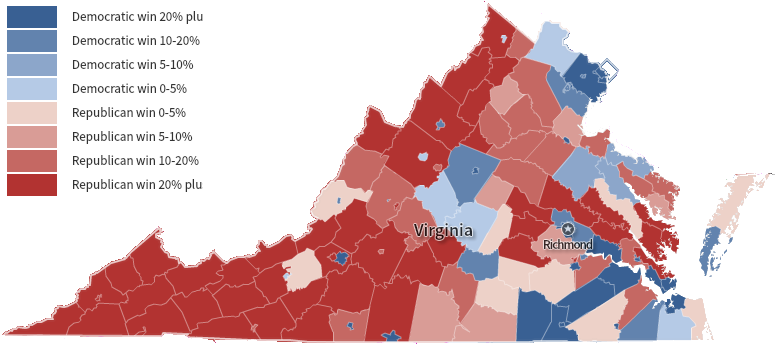
in the 2012 campaign for president, Democratic incumbent Barack Obama won Virginia because heavily-populated urban areas supported him - but every county and some cities west of the Blue Ridge voted for his Republican challenger Mitt Romney, in most cases by large margins
Source: Social Explorer, Election Competitiveness: Vote % Difference Between Democratic and Republican Candidates
The US Constitution, shaped by Virginia politicians, did not anticipate the emergence of political parties. The Constitution was designed to resolve sectional disputes, and to balance power between the states with small and large populations. However, experienced politicians such as James Madison recognized that political factions based on philosophy and policy preferences would organize; reconciling geographical interests would not be the basis of all disputes requiring legislative action.
Washington sought to unite the different states and ensure a lasting Union. He struggled to enhance common military, economic, and cultural bonds to overcome the inevitable differences between people who lived in the Mississippi River vs. Atlantic Ocean watersheds, and between people dependent upon free vs. slave labor. Washington feared that ambitious politicians would foment discord in order to gain personal power, rather than prioritize necessary compromises.
In his September 17, 1796 Farewell Address, Washington noted that political parties served a valuable role to constrain the power of the ruler in countries with monarchs. In a democracy where elections were the tool to constrain excessive power, however, the "spirit of party" exacerbated differences unconstructively. Organized political factions seeking to gain control of government power could ally with foreign nations, potentially splitting the states apart and triggering wars comparable to those in Europe.
The Founding Fathers had a sour perspective on electioneering, viewing it as a vehicle to obtain power for individuals and parties rather than as a mechanism for elected officials to identify civic priorities. The first President warned that "combinations" were:1
- ...likely, in the course of time and things, to become potent engines, by which cunning, ambitious and unprincipled men will be enabled to subvert the Power of the People, & to usurp for themselves the reins of Government.
George Washington was disturbed by the personal animosity and hostility that developed between factions within his administration. Thomas Jefferson and Alxander Hamilton recommended different approaches to exercising Federal powers, based on different interpretations of the role of the national government.
The Federalist and Democratic-Republican parties were the first to develop, and their divergent philosophies were clear in the heated election of 1800. Virginia politicians led the nation as president between 1800-24. In the 1820 election, James Monroe received all but one of the electoral votes. After 1820, the Federalist Party faded away as Andrew Jackson mobilized populist voters on the western frontier.
Jackson's Democratic-Republican party divided to become two national parties in the 1830's, the Whigs and the Democrats.
Both the Whigs and the Democrats split in the 1850's into regional factions that disagreed over the extension of slavery into the territories, especially Kansas and Nebraska. The dispute led to dissolution of the Whigs, the creation of the Republican Party, and the division of the Democratic Party. In 1860, the Northern faction of the Democratic Party nominated Stephen Douglas, but the southern faction walked out of the convention and nominated John Breckinridge in a convention held in Richmond, Virginia.
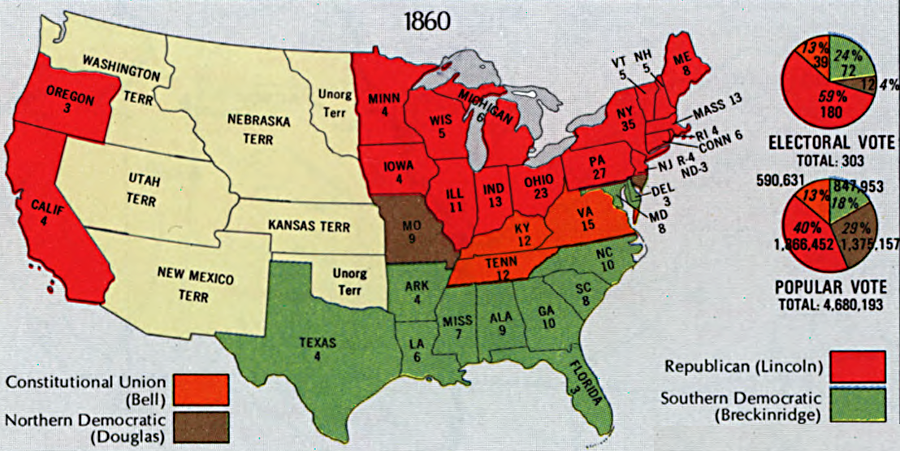
Virginia voted for John Bell, running on the Constitutional Union ticket, in 1860
Source: Library of Congress, "The national atlas of the United States of America," Election Results
Virginia voted for John Bell, nominated by the new Constitutional Union Party in hopes of finding a way to compromise and save the union. After Abraham Lincoln was elected, Virginia seceded from the United States and joined the Confederate State of America in 1861.

in 1860, Virginia narrowly voted for John Bell of the Constitutional Union party
Source: Library of Virginia, Certification of Electoral College, December 1860
The Union was preserved by military force and a four-year civil war, and between 1867-1870 Virginia was under military rule as Military District 1. During Reconstruction, political struggles in Virginia were between the Conservatives and the Republican parties. After the end of military rule and the withdrawal of the Federal Army following the disputed Hayes-Tilden presidential election in 1876, the Republican Party lost any opportunity to win a statewide election. Republicans were too closely associated with the Union Army that had fought across Virginia between 1861-65.

in 1876, Virginia voted for the Democratic candidate for president and became part of the Solid South opposing Republicans, reflecting antagonism towards the party of Abraham Lincoln
Source: Library of Virginia, Journal of the College of Electors of President and Vice President of the United States, 1876
The Conservatives aligned with the national Democratic Party, while opponents formed the Readjuster Party. The Readjuster Party, led by William Mahone, sought to pay less than 100% of the pre-war debt by partially repudiating some of the bonds and/or by modifying the payment dates in order to free up some state funding for social services.
The Conservatives/Democrats in Virginia after the Civil War had no desire to support the newly-freed slaves with taxpayer-funded public schools. They regained power in Virginia after claiming the Readjusters were advocates of social equality between whites and blacks, after which most white voters shifted to the Democratic Party in an alignment that lasted until after World War II.
The trigger for Democratic control was a race riot in Danville just before the 1883 elections for the General Assembly. The riot crystallized the fears of white voters that their control over social norms would be lost, and black voters would force a reduction of white privilege as well as force expenditure of public funds to serve black communities. Voters gave Democrats a majority in the state legislature that they would not lose for the next century.
Democrats consolidated power by electing former Confederate General Fitzhugh Lee as governor in 1885. The Democrats would win every election for governor until 1969.
Virginia remained part of the "Solid South," committed to the Democratic Party, until 1973. The Republicans were painted as liberals, willing to fund programs that benefited African-Americans. Democrats were the party of white privilege, implementing Jim Crow laws that legalized segregation and restricted the legal rights of non-whites.
The 1902 state constitution disenfranchised almost all non-white voters. The challenge of defining "white" culminated with General Assembly passage of the 1924 Racial Integrity Act and the campaign of the first registrar of Virginia's Bureau of Vital Statistics, Dr. Walter Plecker, to categorize anyone with one drop of non-white blood as Negro. Governor and then Senator Harry Byrd established a political machine that dominated Virginia politics until the 1960's. Racism was core to his political control; the Byrd "organization" led the effort to implement a program of massive resistance to block implementation of the Brown vs. Board of Education decision by the Supreme Court.
After the election of Franklin D. Roosevelt in 1932, the national Democratic Party shifted policies and began to support civil rights and higher taxes to fund government programs such as Social Security. The Virginia Democratic Party, under Sen. Byrd's direction, stayed reliably conservative.
All officials elected in statewide elections were Democrats, and the General Assembly was dominated by one party from 1886-1969. There were only a handful of elected Republicans, and patronage for Republicans was limited to Federal appointments by Republican presidents. The state legislature followed Byrd's "pay as you go" approach. In order to minimize taxes and debt, the General Assembly funded new roads and schools from just annual tax revenues and refused to sell bonds.
Starting in 1948, Byrd stopped endorsing the Democratic Party's presidential candidates and maintained a "golden silence" every four years. Republican Dwight D. Eisenhower won Virginia's electoral votes in 1948 and 1952, breaking the "Solid Souh" pattern of always supporting the Democratic Party. John F. Kennedy thought Virginia was "winnable" in 1960 and scheduled scarce time to campaign in Norfolk four days before election day, but in Virginia he lost to Richard Nixon. Lyndon Johnson won in 1964, but then Rpublican candidates won Virginia's elctral votes in every presidential election until 2008.
In state elections, the Democratic Party was in such control that nomination in that party's primary was "tantamount to election." Only in the Ninth Congressional District in southwestern Virginia (the "Fighting Ninth") did Republicans succeed in winning a significant number of races, and one political scientist complained that Virginia was just a "museum of democracy." Virginia lacked viable two-party contests that reflected the shifting priorities of the voters, because the Byrd Machine successfully restricted who could register and vote through devices such as poll taxes.
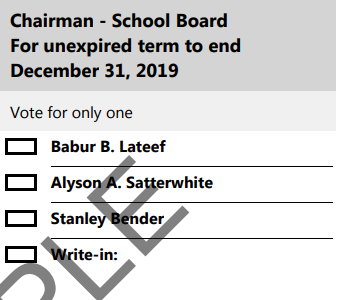
in the 2018 School Board race in Prince William, party affiliations were not listed next to names of the three candidates
Source: Prince William County, Sample Ballot (November 6, 2018)
In Virginia, the increasing population in urban areas was blocked from gaining political power by careful drawing of election districts. Rural voters allied with the Byrd Organization, especially in the Shenandoah Valley and Southside Virginia, dominated elections until 1962.
After the Supreme Court's Baker v. Carr decision, Virginia was forced to redistrict boundaries to comply with the "one person, one vote" standard. That gave more seats to urban and suburban voters in Virginia. They were more supportive of funding for public schools, and more willing to go into debt to finance public infrastructure such as roads.
In 1969, Sen. Byrd was dead and the Democratic Party in Virginia divided between conservatives and more-liberal voters. The Republican candidate, Linwood Holton, won the race for Governor. It was the first time a Republican won, after 21 consecutive elections in which the Democratic candidate was elected as Governor.
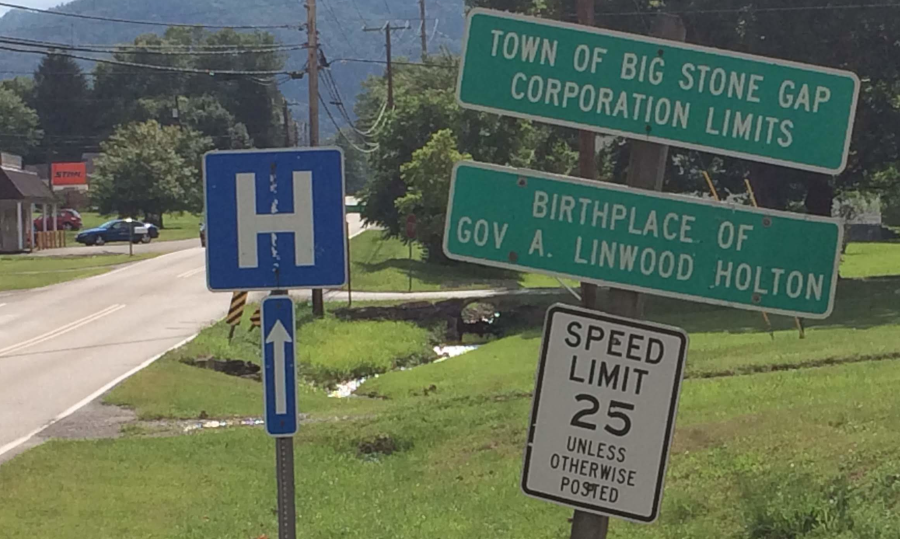
Virginia's first Republican governor, elected in 1969, was a "Mountain and Valley Republican" born in Wise County
At the state level, the Republican Party was viewed as more liberal on race relations, while the Democratic Party was viewed as the conservative alternative in 1969. That was in clear contrast to the alignment of the political parties at the national level. In 1968, Richard Nixon appealed to conservatives in southern states to switch their allegiance, using coded language such as law and order to draw conservatives away from the Democratic Party.
Nixon's election as president was based on a Southern Strategy. It branded the Republican Party as willing to defend traditional practices that discriminated against people of color, and labeled the Democratic Party as "too liberal" on a variety of social justice issues. President Nixon's overwhelming re-election in 1972 demonstrated the success of that strategy.
During Governor Holton's term, the parties realigned in Virginia to match the national pattern. Harry Byrd Jr., who had been appointed as a US Senator to replace his father in 1965, won the Democratic primary in 1966 by the narrow margin of only 8,200 votes of the 435,000 total votes.
Senator Byrd avoided the risk of defeat in the 1970 Democratic primary by choosing to run as an Independent. Not running as a Democrat also meant he was not obliged to sign the "loyalty oath" required by the Virginia Democratic Central Committee. Byrd said he could not commit in 1970 to support the Democratic nominee for president in 1972, since no one knew who would be that candidate. Byrd won in 1970 and again in 1976, and is the last person to win statewide office as an Independent.2
Political conservatives recruited former Governor Mills Godwin to run for governor in 1973 as a Republican. He had been a Democrat in 1966, but in 1972 the Nansemond County Democratic Committee blocked his attempt to go to the Democratic State Convention. He supported the Republican candidate, Richard Nixon, in the 1972 presidential election.
Godwin considered running for governor in 1973 as an Independent, but the Republicans made clear that they would nominate their own candidate rather than tacitly support Godwin as an Independent. If Godwin ran as an Independent and created a three-way race, then liberal Democratic candidate Henry Howell was predicted to win.
Godwin decided to switch parties, reluctantly. At the Republican convention that nominated him, he started his speech with "As one of you..." and receive pre-planned, thunderous applause. Godwin was elected governor in 1973 in a close race, becoming the first person since "Extra Billy" Smith in 1864 to be elected to that office twice. Governor Mills Godwin completed two terms, the first in 1966-70 as a Democrat and the second in 1974-78 as a Republican.3
For General Assembly seats, young Republican candidates replaced older Democrats over the next 25 years. After the 1995 elections, the Democrats were forced to share power with the Republicans in the State Senate.
In the 1999 elections, the Republican Party finally achieved majority status in the General Assembly. That enabled them to control redistricting after the 2000 Census, gerrymandering boundaries to benefit their candidates. Power shifted in the closely-divided State Senate, but Republicans controlled the House of Delegates for 20 years. Between 2015-17, they had a 66-34 majority.
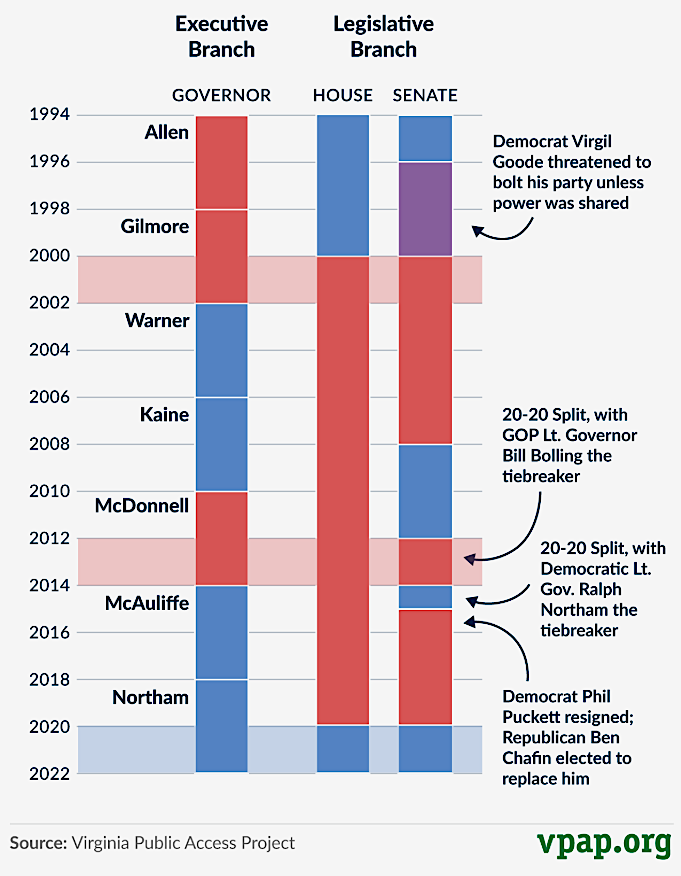
Democrats did not have control of both houses of the General Assembly between 1996-2020
Source: Virginia Public Access Project, End of Divided Government
The recovery of the Democratic Party in Virginia began in the 2001 election, when Mark Warner defeated the Republican candidate. Another Democrat, Tim Kaine, followed Governor Warner in 2005.
In 2005, the debate revolved around ads on religion, immigration, and the death penalty.
Kaine won the urban areas, including Northern Virginia inside the Beltway and 75% of the incorporated cities. Kaine won all the incorporated cities in the strongly-Republican Shenandoah Valley except for Waynesboro; Independent Russell Potts took 12% of the vote in Winchester, muddling the interpretation of the results there.
Kaine lost in the cities of Bristol, Colonial Heights, Emporia, Hopewell, Manassas, Manassas Park, Norton, Poquoson, Salem, Waynesboro. Those urban areas were scattered all across the state; there was not a clear geographic pattern for the city vote in 2005.
The big story that year was that Kaine won so many of the suburbs surrounding the urban centers. A simple summary of Virginia politics, then and now, is that most of the rural vote is still solidly Republican, most of the urban centers are solidly Democratic, and the swing votes are mostly in the suburbs.
Stephen Farnsworth at Mary Washington University capsulized the demographic change that has been reflected in this election in his summary that "Prince William is starting to look more like Fairfax and less like Stafford." Larry Sabato at the University of Virginia noted:4
- The old days of places like Prince William and Loudoun being automatically Republican are over... Republicans are finding that you need to nominate candidates who can communicate with the suburbs.
Republican Bob McDonnell was elected governor in 2009, but the next two governors (Terry McAuliffe and Ralph Northam) were Democrats.
No Republican won a statewide race again until 2021. Democratic candidates won all races for President in 2008, 2012, and 2016. They also won all races since 2009 for US Senator, Governor, Lieutenant Governor, and Attorney General until 2021. The state appeared to shift from a reliably Republican ("red") state to reliably Democratic ("blue").
Between 2014-2019, however, the majority of members elected to both the House of Delegates and State Senate were Republicans. The boundary lines of electoral districts drawn in 2011 were designed to protect incumbents in the House of Delegates controlled by Republicans and in the State Senate, controlled then by Democrats. Special elections in 2014 resulted in Republicans replacing Democrats, and that party controlled the State Senate as well as the House of Delegates between 2014-2019.
In 2017, a "blue wave" replaced 15 Republicans in the House of Delegates and for the second time in a row elected three Democrats as Governor, Lieutenant Governor, and Attorney General. Voters were more energized over the General Assembly's failure to pass any legislation on gun control or expansion of Medicaid than socially-conservative opposition to LGBT rights and abortion. In 2018, incumbent Senator Tim Kaine, a Democrat, was re-elected with 57% of the vote.5
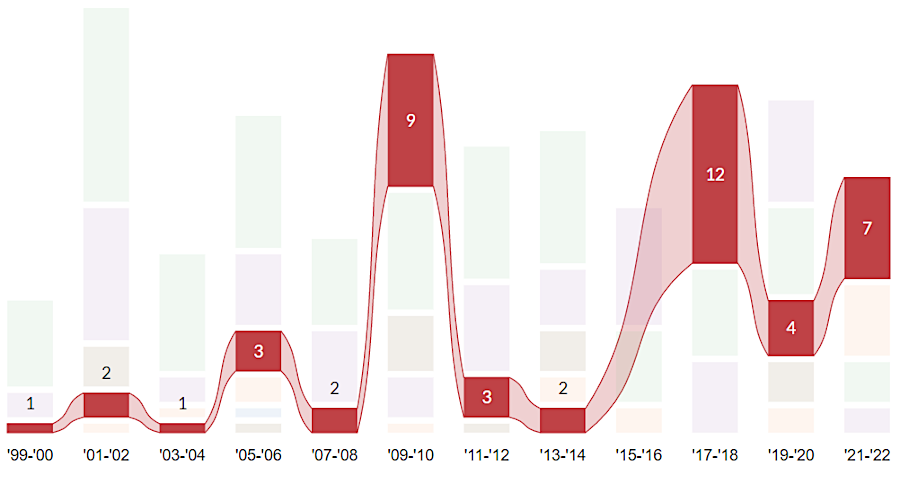
12 incumbents were defeated in the 2017 General Election, a clear contrast to most other elections in the last decade
Source: Virginia Public Access Project, Turnover in the House of Delegates
One of the switches in the 2017 blue wave was in the 13th District for the House of Delegates. Voters replaced the Republican incumbent by electing Virginia's first openly transgender official. The conservative Republican incumbent, Rep. Bob Marshall, had been in office since 1992. He regularly highlighted his opposition to abortion and gay marriage, and tried to get a law passed that would mandate people use bathrooms based on the gender listed on their birth certificate. His defeat reflected not only the high quality of the Democratic candidate who won, Danica Roem, but also how far the suburbs had shifted in their political leanings.
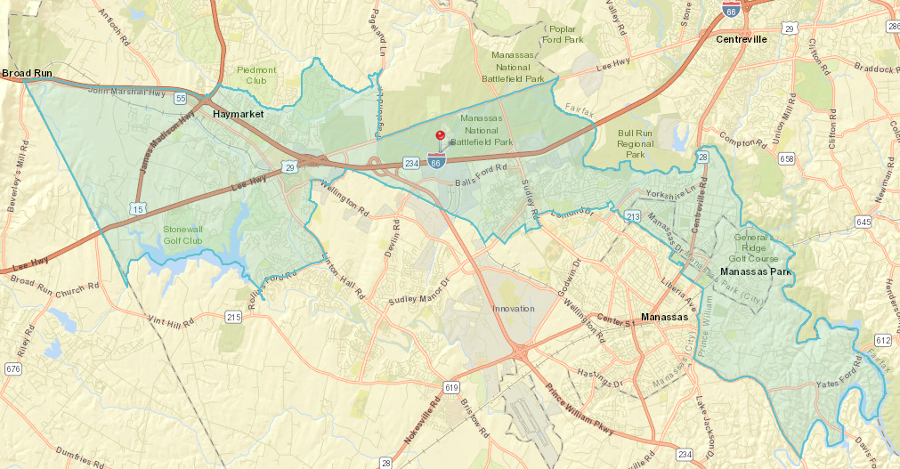
suburban voters, such as the 13th District for the House of Delegates, are key to election success now
Source: Virginia General Assembly, Who's My Legislator
Republicans won enough races in 2017 to keep their narrow control of the State Senate, 21-19, in the 2018 General Assembly session. The Lieutenant Governor who could break a tie on most votes was a Democrat, so each Republican State Senator's vote was critical. In the House of Delegates, Republicans lost their 66-34 majority but still managed to retain a bare majority with 51 of the 100 seats.
A 50-50 tie in the House of Delegates was a possibility for several weeks, after one of the closest elections in Virginia's history. In the 94th District, the vote for both the Democratic and Republican candidates ended up in a tie. The State Board of Elections picked the winner of the race by placing names in two film canisters and picking one out of a bowl. The film canister with the Republican name was chosen, so that party kept control of the House of Delegates for two more years.
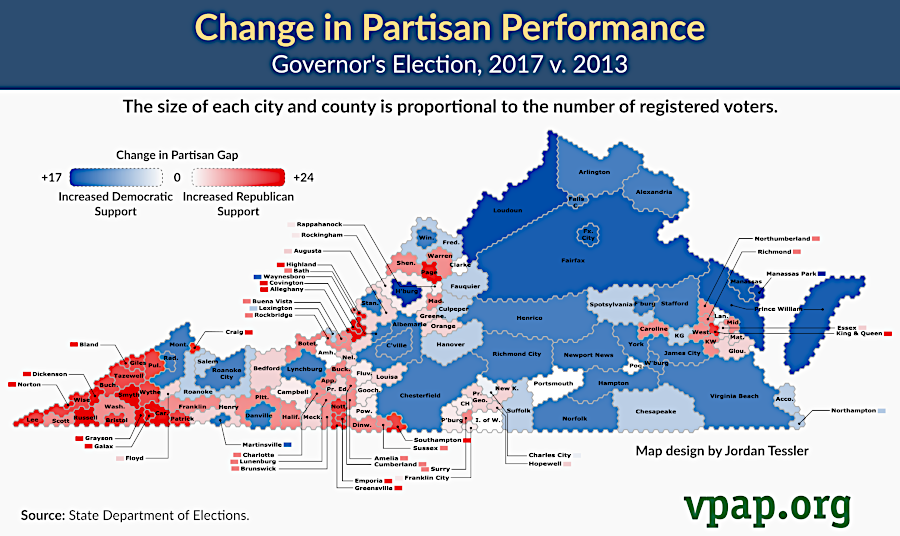
more voters in Virginia's urban/suburban areas supported the Democratic candidate in the 2017 governor's race vs. 2013
Source: Virginia Public Access Project (VPAP), Change in Partisan Performance
Elections have consequences, even when partisan majorities do not shift. Though Republicans retained control of both houses of the General Assembly after the 2017 election, several of them switched their position on expansion of Medicaid as authorized in the Affordable Care Act ("Obamacare"). Expansion within Virginia was a Democratic priority that had been blocked by Republicans, but in a special 2018 session the Republican-controlled General Assembly approved Medicaid expansion.
Former Representative Tom Davis, a Republican who had been elected seven times (1994-2006) to the US Congress from Northern Virginia and served as chair of the National Republican Congressional Committee, highlighted the expanding number of suburban voters in Northern Virginia as the key to the failure of the Republican Party in statewide elections after 2009.
He suggested that Virginia had divided into two one-party states. Rural voters were supporting Republican candidates reliably, while suburban/urban voters were supporting Democratic candidates reliably. Demographic change had steadily reduced the number of rural voters, but Republican Party policies remained focused on their concerns. As Davis noted, vote-rich Northern Virginia resembled New Jersey while rural Virginia resembled Alabama, and the Republicans:6
- ...keep running Alabama candidates and Alabama campaigns, and they've just quit communicating with the northern Virginia suburbs... The Republican base has migrated from the country club to the country.
When the Democratic Party in Virginia began to swing to the progressive left after major successes in the 2017 and 2018 races, Tom Davis also made clear where he expected future elections would be won or lost in Virginia by repeating the lesson learned from Tim Kaine's victory in 2005:7
- He who owns the center owns the suburbs.
In 2017, female candidates defeated male candidates in 11 of the 15 House of Delegates seats that flipped to the Democrats. In 2018, Democratic women defeated two male Republican candidates to flip their seats in the US House of Representatives (plus a third seat, where the Republican incumbent was female). The priorities of suburban women appeared to be the key to winning election.
In 2019, a Democratic state senator elected from Northern Virginia suggested the Republican Party could recover in the region by adapting to the priorities of the voters there:8
- It would be nice if we did have a two-party system in Northern Virginia... but it will only happen when Republicans rethink their message. They'll have to do that eventually. Everybody wants to be relevant.
Tim Kaine had been the Democratic candidate for the US Senate in 2018. His victory in that race was the ninth statewide election in which no Republicans was elected to a statewide office. In every jurisdiction, the Democratic percentage of the vote in 2018 was higher than in 2017.
A professor at Mary Washington University, with long experience observing Virginia politics, suggested demographic changes would benefit Democratic candidates even more in the future. He advised the Republican Party to adapt to the concerns of the changing electorate in suburban and urban areas, rather than continue to rely upon traditional Republican voters in rural areas:9
- There's an old saying that there is not much one can learn from the second kick of a mule. In Virginia's 2018 Senate race, the commonwealth's voters provided the Republican Party of Virginia with its ninth mule kick in a row.

in 2019, one of the few Republicans in the House of Delegates from a Northern Virginia district described himself in a fundraising effort as an "endangered species"
Source: Dave LaRock for Delegate
In the 2019 General Assembly races, Democrats were far more successful in recruiting candidates. There were 91 Democratic candidates for the 100 House of Delegates seats vs. 72 Republicans. In 2011, Democrats were able to recruit only 54 candidates, leaving 46 seats uncontested.
The Democratic Party was helped when a Federal judge forced a redistricting of 11 House of Delegates districts, ruling that the boundary lines had been drawn unconstitutionally to pack black voters into a limited number of districts. Ultimately 26 districts had their boundaries changed before the 2019 election, and Democratic voters were added to districts which had been "safe" for Republican candidates.
For the 40 State Senate seats in 2019, there were 35 Democratic candidates vs. 25 Republicans. In 2011, Democrats had been able to recruit only 28 candidates.10
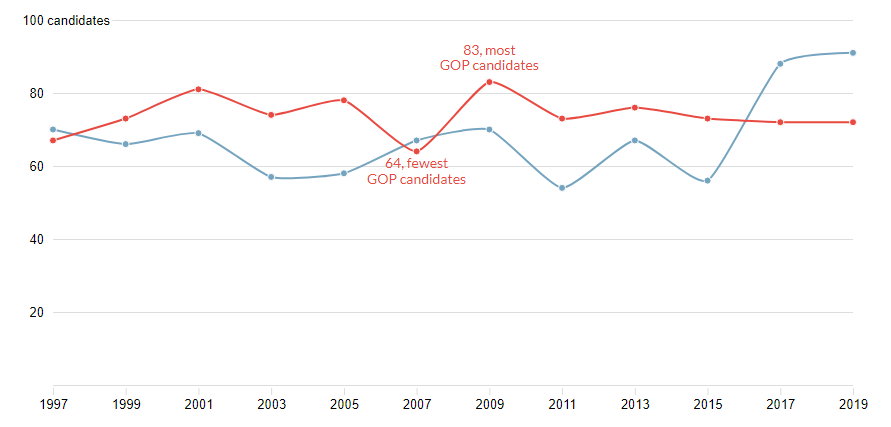
recruiting candidates is an essential first step in winning majority control of the House of Delegates, but both political parties always leave some of the 100 seats uncontested
Source: Virginia Public Access Project, Legislative Candidates: Ebb and Flow
In the 2019 general election that year, Democrats flipped six more seats in the House of Delegates to take a 55-45 majority. That created a dramatic contrast to the 2015-17 House, in which Republicans had a 66-34 majority. In 2017, the Democrats had flipped 15 seats and lost a chance to force a 50-50 power sharing agreement only when the vote for the 94th District ended in a tie. The name of the Republican candidate was picked our of a bowl, and he served another two year term until being defeated in a 2019 re-contest.
In the State Senate, in 2019 Democrats flipped two seats and took control of the other half of the General Assembly with a 51-49 majority. In addition, the Lieutenant Governor was a Democrat, so he could break tie votes on most issues in the State Senate.
It was the first time since 1995 that Democrats had controlled both houses of the General Assembly. The key to gaining control of the State Senate in 2019 was winning two races in suburban districts that had previously supported Republican candidates.
After the 2019 election, Democrats were sitting in the offices of all five statewide offices (two US Senators plus Governor, Lieutenant Governor, and Attorney General) and controlled both houses of the legislature. Democrats also occupied seven of the 11 US House of Representatives seats.
Larry Sabato's Crystal Ball headlined its report on the state election "Virginia: The New Democratic Dominion." On the night of November 5, 2019, Governor Ralph Northam exclaimed at the victory celebration in Richmond:11
- Virginia is officially blue!
The chair of the Prince William Board of County Supervisors, Corey Stewart, had chosen not to run for re-election in 2019. He had been the Republican candidate for the US Senate in 2018, but received only 41% of the vote statewide and only 33% in his county. His "firebrand" approach to immigration, abortion, and gun control issues was clearly out of synch with the electorate both statewide and locally.
In the 2019 general election, voters changed the 6-2 Republican majority of the Prince William Board of County Supervisors to a 5-3 Democratic majority and elected the first Democrat to serve as the chair in 20 years. Corey Stewart evaluated the results in his typical blunt style:12
- The Republican Party is toast in Virginia for the next 10 years... Republicans will cease to be a serious political power.
The Washington Post echoed his opinion, and harshly assigned blame for the Republican defeat:13
- Mr. Stewart, assessing this week's Democratic gains, said Republicans would be "toast" in Virginia for 10 years. That may be right; if it is, Mr. Stewart himself was a prominent toaster.
- Mr. Stewart's brand of Republicanism - immigrant-bashing, Confederate-monument-revering, gun-loving, abortion-blocking, trash-talking and, lately, Trump-lionizing - has been ascendant in Richmond and elsewhere. It has methodically alienated moderate and swing voters, especially in the vote-rich suburbs of Northern Virginia, Richmond and Hampton Roads. In a state that won the competition for Amazon's second corporate headquarters partly on the strength of a well-educated, multicultural workforce, Republicans who threw red meat to their base by attacking undocumented immigrants found their appeal waning.
Former US Representative Robert Hurt, now dean of the Helms School of Government at Liberty University, was more positive than most pundits after the election regarding the status of the Republican Party in Virginia:14
- You have to be very careful in drawing broad long-term conclusions... I don't think last night was this tsunami or tidal wave. It was just enough to swamp the boat.
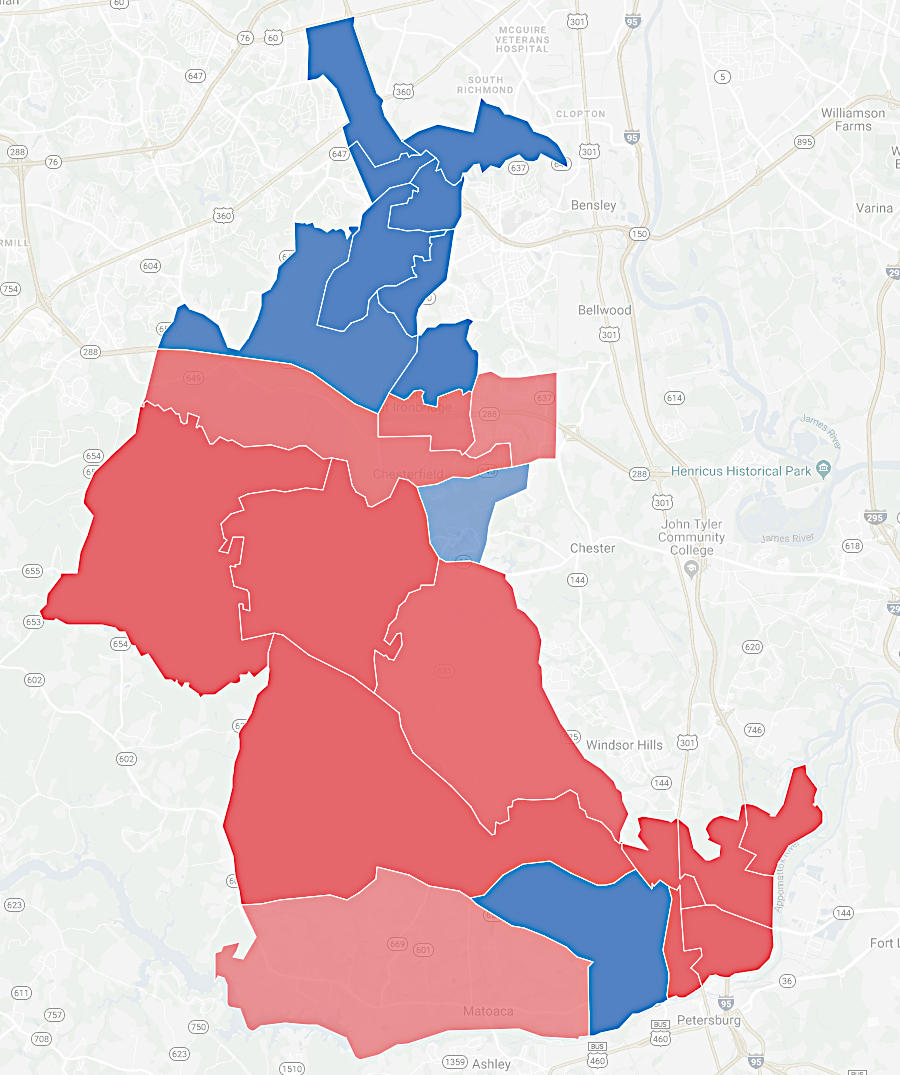
Republican Del. Kirk Cox won re-election in 2019, despite the redistricting which added Democratic-supporting voters in Chesterfield County
Source: Virginia Public Access Project, Election Results 2019 - House of Delegates District 66
Republicans were not "wiped out" in 2019. Democrats won all the offices in the suburbs of Northern Virginia, but Republicans won eight seats in the suburbs of Richmond and Hampton Roads that Gov. Ralph Northam and Senator Tim Kaine had carried in 2017 and 2018. Only two seats flipped in the State Senate, though the change in 5% of the seats gave the Democratic Party control of that chamber.
In Senate District 7, the seat was open after Sen. Frank Wagner took a job with the state government. The Republican had been elected five times and served for 19 years, but the Democrats were optimistic that they could flip the seat. In the race to replace him, Republican Jen Kiggans won 50.36% of the vote in that suburban district. The Virginian-Pilot headlined an editorial about local election results "Virginia's blue wave washes out locally."
In suburban Chesterfield County, Republicans won three of the four countywide races and retained a 4-1 advantage on the Board of Supervisors. The Chesterfield Observer concluded:15
- ...the "blue wave" crashed into a fortified red sea wall in Chesterfield.
Del. Kirk Cox, Republican Speaker of the House of Delegates, had court-ordered redistricting add majority black portions of Chesterfield County to his district, making his electorate 32% more Democratic. Del. Cox won re-election, though the Democratic victories in other districts meant he would no longer be the Speaker with power to assign other delegates to committees. Del. Cox became the Republican representing the "bluest" district for his party, and his Chief of Staff commented after the 2019 election that there was not:16
- ...anyone else in the Commonwealth of Virginia that can hold that seat but Kirk Cox.
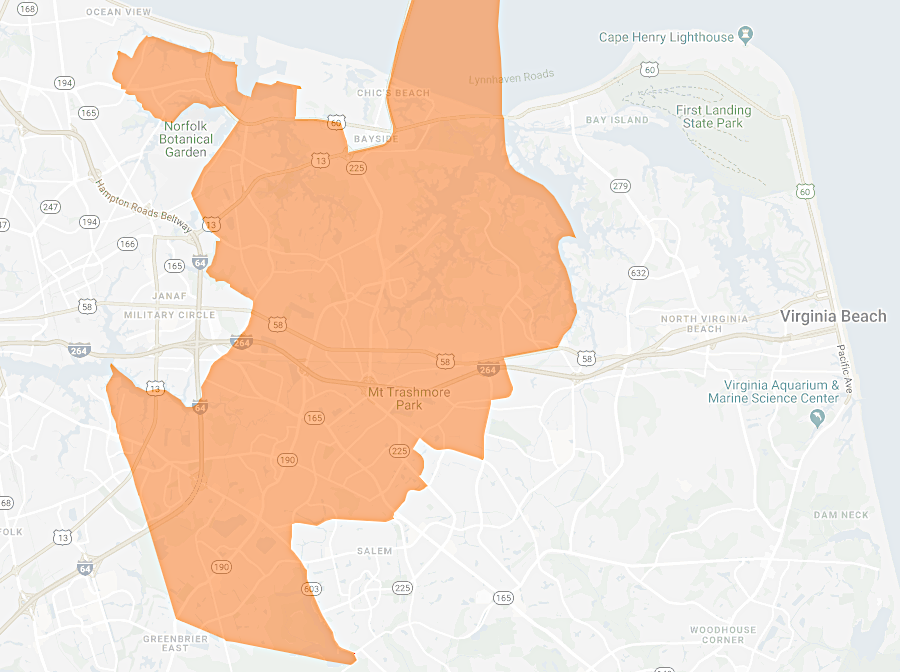
in 2019, the Republican candidate won the suburban State Senate District 7
Source: Virginia Public Access Project, State Senate District 7
However, Cox chose not to try again in 2021. Instead of waiting to see the results of the redistricting of the boundaries in the Chesterfield County suburbs, he chose instead to run as a statewide candidate and ran for governor. (In the November 2021 election, the Republican nominee did win the race to replace Cox.)
Political observers noted that the one previously-announced candidate for the Republican nomination was a conservative firebrand unlikely to attract votes from outside the base that supported Donald Trump. Del. Cox made clear that he would take a pragmatic approach and seek support from independents and Democrats, saying as his Republican rival supported last-ditch efforts to block the election of Joe Biden as President:17
- I think there's a myth out there that every issue is hand-to-hand combat between either a conservative/liberal or Democratic/ Republican view... We have issues that are that and they're important... you need to have core principles and you need to be able to argue those. The challenge, I think is this: In a part-time citizen legislature like Virginia, you have to have respect for the other side and respect for their ideas. We need to be careful not to become too much like Washington.
The chair of the Democratic Party of Virginia highlighted in 2021 that there were 97 Democrats seeking election to the 100 seats in the House of Delegates, surpassing the 2019 record of running Democrats in 92 districts. Contesting for seats in districts considered reliably Republican was part of a conscious strategy to build support in rural areas. Though Democrats expected to lose in roughly half the districts in 2021 and had little chance of winning in most districts west of the Blue Ridge or in Southside, contested races for House of Delegates seats every two years were expected to build support. In future elections, a Democrat might have a realistic potential to actually win election in some rural areas, outside of city and suburban districts.
The 17 Democrats running for statewide office in 2021 was an unusually high number. Five people sought nomination as governor, more than any other time in the last century. The closest was in 1949, when the Byrd organization was threatened and four people competed in the party's primary. The number of candidates in 2021 reflected the perceived value of the Democratic nomination, at a time when Republicans appeared unable to win statewide races. The competition also reflected a level playing field. Virginia no longer had an organization of traditional Democratic Party leadership which could quietly assemble a preferred ticket with geographic balance, and ensure the nomination of preferred candidates for Governor, Lieutenant Governor, and Attorney General.
One Democratic state legislator attributed his party's success to the unpopularity of President Trump in 2019:18
- Donald Trump is the gift that keeps on giving
Others suggested that electorate had fundamentally changed. Once President Trump faded into history, there would still be little hope for a resurgence if Republican candidates continued to focus on guns, abortion, and other socially-divisive issues that were at odds with the priorities and concerns of voters who were increasingly suburban, college-educated, and non-white. Quentin Kidd, a political scientist at Christopher Newport University, noted:19
- We saw huge numbers of energized voters in the suburbs - suburban women especially were the backbone of that...
George Mason University professor of public policy Mark Rozell assessed the Republican Party's opportunity to regain control in upcoming elections:20
- Democrats have had an easy time characterizing the Republicans as out of the mainstream on issues... Republicans in Virginia need to rebrand, refocus and broaden their appeal.
A conservative blogger, James Bacon, shared that perspective:21
- Republicans got their booties kicked. And the butt-stomping is not likely to subside...
- ...the fastest-growing region of the state, Northern Virginia, now is pure blue with bits of purple on the exurban fringe. By contrast, Republican strongholds in rural Virginia have shrinking or stagnant populations...
- ...Republicans need to re-define who they are and what they stand for, or they will become a permanent minority. News reports say that dislike of Donald Trump drove Democratic voter turnout, but the Blue Tide is much broader and deeper than voter animus of one man. Take Trump out of the equation after the 2020 election, and Virginia Republicans still have a huge problem...
- ...What does a rejuvenated Republican Party look like?... First, it would take the culture-war issues off the table.
Another more-liberal blogger for the Bacon's Rebellion site also emphasized that the 2019 "massacre" reflected a fundamental disconnect between the Republican agenda and Virginia voters. He sought to deflate the demographic migration argument that "NoVa Yankees," new residents moving from out-of-state into Northern Virginia, were responsible for the defeat:22
- This Republican fairy tale holds that people from the north have moved to Northern Virginia seeking federal jobs and tipped the political balance in the Old Dominion to the Democratic Party. The easiest rebuttal to that absurd notion is Henrico County (outside of Richmond). Once a hotbed of conservative Republicanism the county is now reliably Democratic. Even the dream weavers of Virginia's Republican Party can't blame the loss of Henrico County on transplanted federal employees in Northern Virginia.
The chief of staff for former Rep. Frank Wolf, one of the last Republicans elected to the US House of Representatives from Northern Virginia, said of the 2019 results:23
- If you didn't see this coming, you've been living under a rock.
The Republican Party leadership was not quick to concur that it should alter traditional political priorities. When the Republicans in the House of Delegates chose a new leader after the 2019 election, they picked the more-conservative candidate. The 11 recommendations from the Suburban Virginia Republican Coalition, in its post-election "Republicans in Suburbia: Where Do We Go From Here?" report, proposed just how the campaign machinery could be enhanced. It offered no suggestions for shifting emphasis on public policy issues to enhance the Republican Party's appeal to voters living in the suburbs.
The new Republican Minority Leader in the House of Delegates said at the start of the 2020 General Assembly:24
We are still relevant... we think that very quickly the voters of Virginia will begin to get buyer's remorse about what they've done here.
Shifts in control of the General Assembly result primarily from "open seats" being won by the other party. It is unusual in the modern era for an incumbent to be defeated. The 2017 election was a rare "wave" in which 15 House of Delegates seats flipped, and 12 Republican incumbents lost their races that year. None of those who ran in 2019 were able to defeat the now-incumbent Democratic delegates.25
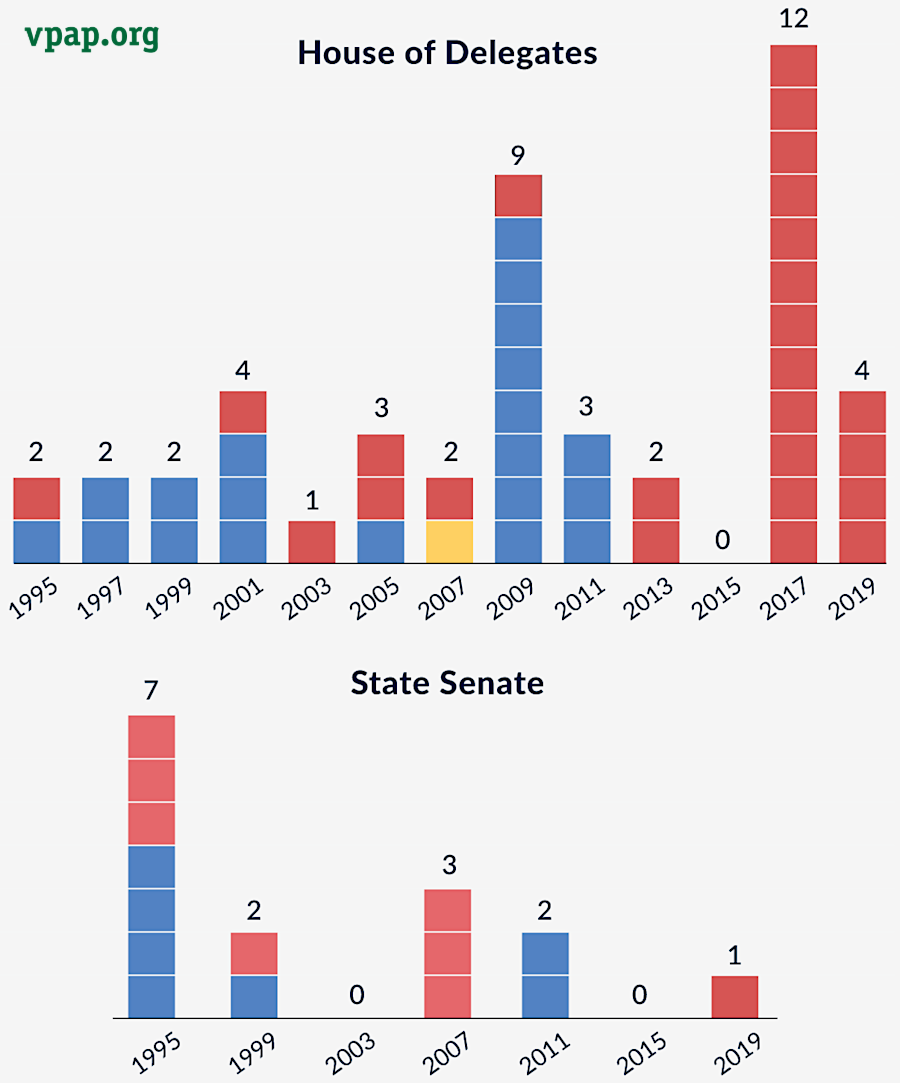
the defeat of 12 Republican House of Delegates incumbents in 2017 made it a "blue wave" election for Democrats
Source: Virginia Public Access Project, Incumbent Defeats (November 12, 2019)
A common assumption prior to the 2019 election was that a high turnout, with a higher percentage of registered voters going to the polls, would benefit Democratic candidates. Older and predominately white male voters are most likely to cast a ballot year after year. College-educated women, millennials and Gen Z voters, and minority-race voters engage in higher-profile elections more often when there are contested seats for Federal offices or governor. In low-turnout races, the participation rates by the older and the predominately white demographic groups gives Republican candidates an advantage.
In 2011 and 2015, two "off off year" elections with no Federal or statewide races, turnout was just 29% of registered voters. In 2012 and 2016, with contested presidential races generating interest, over 70% of registered voters cast a ballot.
In 2019, almost 40% of registered voters participated in the election. That exceeded the previous record of 36% in 1999.
Elections to Virginia's State Senate occur in the "off off years," so low turnout has the greatest impact on who is elected to the four-year terms in that half of the General Assembly. In 2019, of the six races with the greatest percentage of turnout, Republicans won five of the seats. In the House of Delegates, Republicans won 12 of the 18 highest-turnout races. The conventional wisdom, that a higher percentage of voter turnout gave Democratic candidates an advantage, was not as valid as presumed.
In May 2025, pre-election polls indicated the Democratic candidate for governor had a 17% lead among registered voters but only a 4% lead (close to the margin of error in the poll) among those who were likely to vote. To win the election in November, the Democratic candidate would have to get supporters to actually cast a ballot rather than just have an opinion.26
Three weeks after the 2019 election, the Roanoke Times assessed the higher turnout and the "demography is destiny" argument. The paper's editorial claimed that voters who were not born in America were not automatically inclined to be Democrats, but that nativist policies of the Republican Party were driving the naturalized citizens away:27
- There's no reason why immigrants would automatically be left-of-center voters (historically some immigrant groups have tended to be conservative voters) - except that they've been driven away by the ugly rhetoric of some in the modern-day Republican Party under Donald Trump. Do Republicans want to be a party of conservative ideas or a party of ethno-nationalism? If the former, there's no reason why they can't be competitive in the future. If the latter, then demography - not Democrats - doom them to permanent minority status.
After the 2019 election, opponents of gun-related legislation succeeded in getting 97 of the 133 cities and counties in Virginia plus 18 towns to adopt some form of a resolution declaring the local jurisdiction would be a Second Amendment sanctuary or "constitutional" community. A Republican who had served in the House of Delegates commented:28
- I don't think the GOP is at a loss for middle-aged white guys who care about guns.
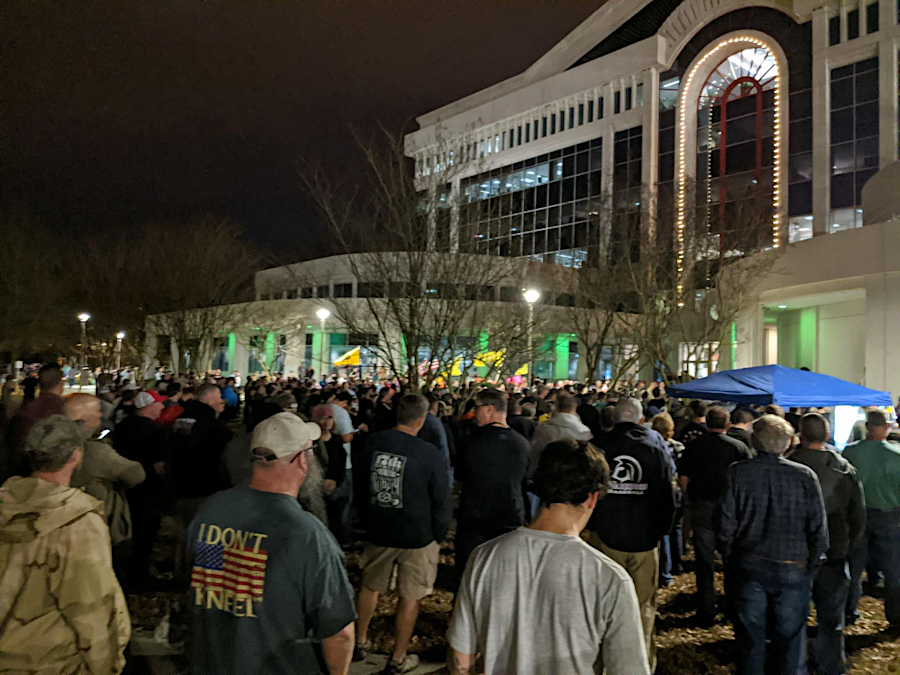
a gun rights rally in the City of Chesapeake after the 2019 General Assembly election drew an overflow crowd
Source: Virginia Citizens Defense League
The Second Amendment sanctuary movement reflected an extraordinary outpouring of civic engagement. Advocates for gun rights used fiery language, and defined Virginia as "ground zero" for Second Amendment rights. The Virginia Citizens Defense League planned a Lobby Day rally at the State Capitol on January 20, 2020 with "enough citizens armed with handguns to take over a modern midsized country."
Some extremists claimed incorrectly that Governor Northam had called out the National Guard to start seizing guns that had been legally registered within the state. The governor made clear that he was proposing "common sense" gun legislation, based on the eight bills he had submitted for a special session of the General Assembly in July, such as a one-handgun-per-a-month purchase limit that was the law in Virginia between 1993-2012. Republican leaders of the State Senate and House of Delegates adjourned that session after just 90 minutes, without considering any of the legislation.
Claims that the state government was planning to seize weapons owned by individuals created a channel for Republicans to regain majority status in Virginia. The National Rifle Association supported the partisan perspective that the General Assembly, which was controlled by Democrats after the 2019 elections, and the Democratic governor were not supporters of the Second Amendment and planned to confiscate registered guns. A spokesperson said just before the 2020 General Assembly stated:29
- Gov. Northam's gun confiscation scheme has energized our members and supporters unlike anything we've ever seen in the commonwealth and beyond.
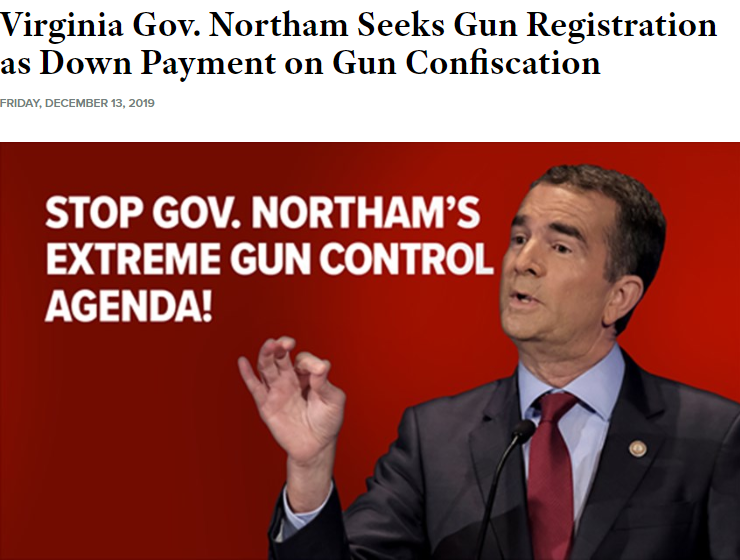
the National Rifle Association claimed Democratic Governor Northam planned to confiscate guns
Source: National Rifle Association, Institute for Legislative Action (December 13, 2019)
While the Second Amendment sanctuary movement showed how the issue energized some voters, at the same time a Virginia Commonwealth University (VCU) Center for Public Policy poll suggested that 53% of Virginians thought gun laws should be stricter, 30% thought the laws were about right, and just 17% thought the gun laws in Virginia should be less strict.30
If that particular poll reflected the preferences of voters, then the gun rights issue would not be a successful path for Republicans to win statewide elections.
The highly-controversial gun rights issue had been highlighted before the 2020 elections. Governor Northam had called a special session of the General Assembly for July, 2019, and proposed "common sense" measures to reduce the nearly 1,000 deaths from gun-related incidents each year. The special session occurred five weeks after 12 people were murdered in a mass shooting at a Virginia Beach municipal building, and five months prior to the elections for all 140 members of the legislature.
The Republicans in control of both the House of Delegates and the State Senate adjourned the special session after meeting for 90 minutes. All bills were referred to the Virginia State Crime Commission for study, and no other action was taken.
The 2020 legislature was dramatically different, after voters elected a Democratic majority in both houses in November 2019. The State Senate rejected the governor's proposal to ban the sale of assault weapons such as the AK-47, the different General Assembly after the 2019 elections passed much legislation that had failed in previous years.31
On April 10, 2020, he signed into law, or referred back to the legislature for minor amendments, the other "common sense" proposals he had made back in 2019 and which had been approved in 2020. The National Rifle Association Institute for Legislative Action still claimed success, despite the change in political power after the 2019 elections and the General Assembly's endorsement of all items in the governor's gun-related agenda except the assault weapons ban:32
- Thanks to broad opposition from citizens across the state, Gov. Northam was unable to get his comprehensive gun ban passed this year. He stated during his press conference that he will seek it again next year. Make no mistake, the anti-gun majority will be back in 2021 to push their agenda once again.
A graphic of the pattern prior to Gov. Northam's decisions on the legislation reveals that the partisan differences between governors and the legislature are reflected in the pattern of vetoes:33
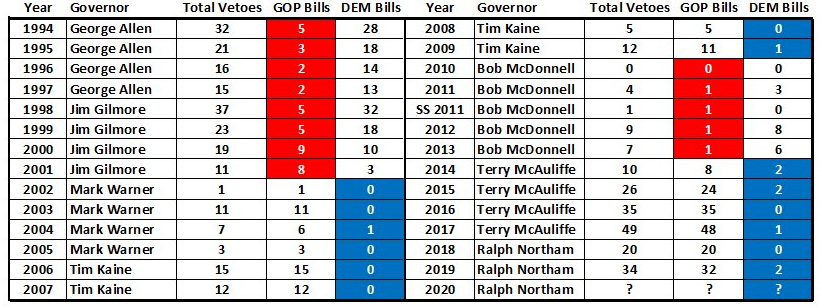
Republican governors veto mostly bills sponsored by Democrats, and vice-versa
Source: VA Capitol Square tweet, Partisan Breakdown of Virginia Vetoes (April 11, 2020)
Mobilization around gun rights may have led to Republican success in the Staunton City Council elections in May, 2020. The city had been a "blue dot" surrounded by reliably-Republican Augusta County for years; a majority of voters had supported Democratic presidential candidates in the last three elections. However, the 6-1 Democratic-controlled city council became a 4-3 Republican majority, after four Republicans won three seats in the May 2020 vote.
Three of the Democratic incumbents were defeated in a race where local issues were a major factor, and as in all local elections in Virginia no party labels were next to candidate names on the ballots.
Changing the name of Robert E. Lee High School back to Staunton High School had energized local conservatives, and the 6-1 Democratic majority had declined to hold a public hearing on a resolution to declare Staunton to be a Second Amendment sanctuary city. A decision to furlough fire fighters, approved just a week before the election, may not have helped the challengers win but may have helped the incumbents lose.
The election, held after a two-week postponement by the governor during the COVID-19 pandemic, had high turnout. Those who chose not to vote absentee went to polling places with masks and hand sanitizer. However, Mary Baldwin University students, normally heavily-Democratic, had been sent home in March. Some students may have failed to vote absentee, in an election where 17% of the total vote was absentee. The Democratic candidate who finished in fourth place in the three-seat race was only 27 votes behind the winning Republican.
In 2020, 27% of those registered to vote cast ballots in the election for Staunton City Council. In comparison, the 2016 election had only 13% voter turnout. One local commentator noted:34
- Democrats got their voters out. Republicans just got a lot more of theirs out.
At the national level, both political parties treated Virginia as a competitive state in presidential races only between 2008-2016. In the 2004 race, Virginia was considered to be reliably Republican; it had not chose a Democratic candidate for president since 1968. In 2008, Barack Obama flipped the state, after concluding his campaign at the fairgrounds in Prince William County. He won again in 2012, again finishing his campaign in suburban Prince William.
Republican candidates Mitt Romney and Donald Trump invested heavily in Virginia in 2012 and 2016, but lost. After the 2019 elections for the General Assembly flipped both houses to Democratic control, the state became perceived as reliably "blue." In the 2020 presidential election, neither party considered it a wise investment to fund extensive campaign efforts; Virginia was no longer a swing state in their calculations. A political scientist commented:35
- Virginia was the belle of the ball in 2008, and again in 2012, and still once more in 2016, but in 2020, the commonwealth is a wall flower.
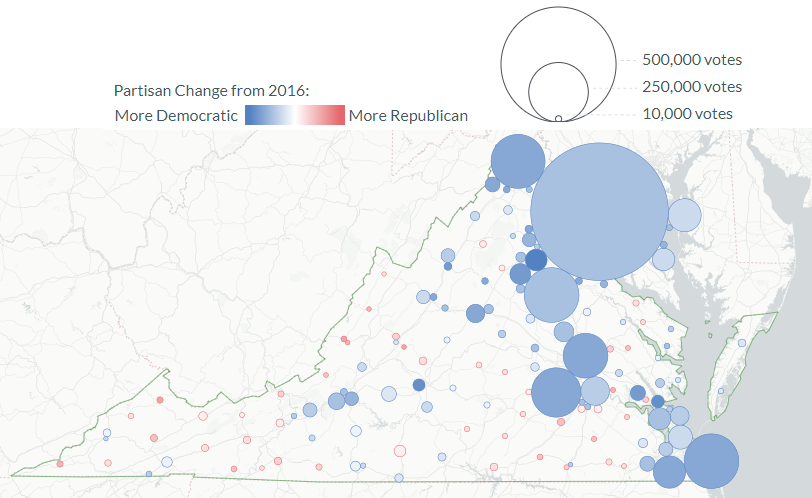
support by urban and suburban voters for Democratic candidates has led to Virginia being declared a blue state
Source: Virginia Public Access Project (VPAP), Partisan Change from 2016
Nonetheless, President Trump brought Air Force One to the Williamsburg-Newport News Airport in September, 2020. His campaign event in Newport News was focused not on Virginia voters, though his appearance would help the Republican candidate in a close race for the 2nd> District in Virginia for the US House of Representatives.
President Trump was targeting people living in northeastern North Carolina. The Virginia airport was more suitable for the presidential jet, but the media coverage in Newport News would carry his campaign message to the voters across the state line. In North Carolina, the polls gave Trump only a 1% lead at the time, while the Republican candidate for the US Senate was behind.36
Joe Biden won 54% of the vote in the 2020 presidential race, and Republicans failed in their efforts to flip back any of the three US House of Representatives seats lost to the Democrats in 2018. The trend of the suburbs to move into the Democratic column continued. Biden won seven jurisdictions that had voted for Trump in 2016 - Chesterfield, James City, Caroline, and Stafford counties, plus the cities of Virginia Beach, Chesapeake, and Lynchburg.
The 2020 presidential election revealed a widening gap between rural and urban voters. A higher percentage of voters in the cities and Northern Virginia supported the Democratic candidate in 2020 compared to 2016. In rural areas, the shift was towards the Republican candidate. The 75% high turnout in 2020 indicated that the division was not a statistical anomaly.37
The Republican Party staged a successful comeback in 2021. They won the statewide races for Governor, Lieutenant Governor, and Attorney General, and flipped seven House of Delegates seats to take control with a 52-48 majority.
Foollowing the loss of control of the House of Delegates the remaining Democrats replaced their leader, Eileen Filler-Corn, with Del. Don Scott. The fundamental issue was that Filler-Corn had not spent $900,000 in funds raised for campaigning in 2021. Two candidates in Hampton Roads might have won, rather than lose by 115 votes and 94 votes, if the money had been utilized rather than kept for another day.
The chair of the Republican Party who orchestrated the comeback commented about the changes in political power between 2017-2021:38
- I have always said to Republicans and Democrats alike, "If you think after a particular election there's been a permanent realignment of the voting public, that's foolish talk..." Things in politics can turn on a dime. Everyone was shocked in '17 and '19, the way it flipped. And look what happened in 2021. It's a pendulum business, and it has been for 250 years.
The 10 jurisdictions with the largest populations gave Terry McAuliffe an advantage of 287,321 votes - and he still lost. Glenn Youngkin won 86 of the 95 counties, plus 14 of the 38 cities in Virginia.
The 2021 election swung political power in the House of Delegates away from Northern Virginia. The new Republican Speaker for the 2022 session came from the Shenandoah Valley, while the new Majority Leader was from Southwest Virginia:39
- Under the Democrats, the two top leaders in the House were two women from Northern Virginia: Speaker Eileen Filler-Corn of Fairfax County and House Majority Leader Charniele Herring of Alexandria, the latter being the chamber's first Black majority leader. Now the leadership will be two white men from west of the Blue Ridge, one of them so far west that he lives closer to seven other state capitals than his own.
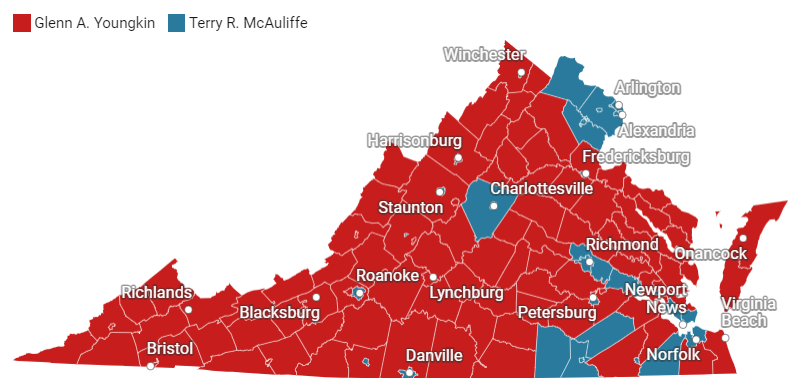
in 2021, Republicans swept the statewide races and captured the House of Delegates, shifting power there to delegates elected from rural Shenandoah Valley and Southwest Virginia
Source: Datawrapper
In additional the presidential election every four years, there are only five offices filled by statewide votes - two US Senators, Governor, Lieutenant Governor, and Attorney General. Rural districts are expected to elect Republican candidates for US House of Representatives, House of Delegates, and State Senate offices. The two parties will continue to compete in the suburbs, where voters will determine which party will win majority control of the General Assembly and the state's delegation to the US House of Representatives.
Southwestern Virginia, home of the "Fighting Ninth" congressional district, became a reliably Republican region. In 2020-2021, after the murder of George Floyd in Minneapolis led to proposals by Democratic Party leaders to increase oversight of police activities, the elected sheriffs in Buchanan, Tazewell, and Smyth counties switched from the Democratic to the Republican parties. That left only two Democratic sheriffs in the region, in Dickinson and Russell counties.
Lee County, in the southwestern corner of the state, gave President Trump 84% of the vote in 2020. Democrats did not even bother to nominate an opponent to Rep. Morgan Griffith in the 9th District race for the US House of Representatives.
In 2020, President Biden won the statewide election - but had a majority in only 35% of Virginia's jurisdictions. He captured 46 of the states 133 cities/counties. Because the number of voters in the 46 jurisdictions exceeded the number in the other 47, Biden won Virginia's 13 electoral votes. However, the geographic imbalance created a problem in the 2021 redistricting process. The concentration of Democratic voters in urban areas meant that many of the 140 General Assembly districts would be primarily rural. Republicans had a chance to win a majority of State Senate and House of Delegates districts, even while losing statewide elections.

in the 9th District, Democrats did not nominate a candidate in 2020 and the Republican incumbent ran unopposed for his House of Representatives seat
Source: Virginia Department of Elections, 2020 November General
In the 2022 election, Republicans increased their share of the vote in rural areas. They also saw increased turnout in rural areas, increasing the statewide percentage of Republican votes.
In Appomattox County, Republican Bob Good got 79% of the vote in his 2022 re-election to the 5th District seat in the US House of Representatives. In Bath County, Rep. Ben Cline also captured 79% of the vote.
In Russell County, back in 2001 Democrat Mark Warner got 60% of the vote in his run for governor. A decade later, the Democratic Party still captured 42% of the vote. In 2022, its share dropped to 17%. The Democratic Party had not campaigned with an "every county, every vote" philosophy. The resulting disenchantment in rural areas was clear, and that party required large percentage victories in urban and suburban areas to offset the rural vote.
Dwayne Yancey, an experienced observer in Southwest Virginia, recognized that the Democratic vote in rural counties was actually increasing, but Republicans were recruiting a much higher percentage of people who had not voted in the past. For example, Northampton County's population was essentially stable between 2013-2021. Mark Herring was the Democratic candidate for Attorney General in 2013, 2017, and 2021, and gained more total votes in Northampton County during each election. In 2013 Herring got 2,020 votes; in 2021 he got 2,588 votes.
However, Republican "get out the vote" efforts were far more successful. In 2013 the Republican candidate in Northampton County got 1,854 votes. In 2023, the Republican candidate got 2,625 votes. Rural turnout helped the Republican win all three statewide races in 2021.
Yancey noted that General Assembly and US House of Representatives districts are geographically based. The high percentage of rural districts would benefit Republican candidates and help that party gain control of the state and national legislatures. The Democratic strategy of running up the percentages in a small number of urban districts might help that party win statewide races, but Yancey predicted "the continuing [relative] collapse of the Democratic Party in rural Virginia" and:40
- The declining Democratic numbers in the western part of the state make it harder for a Democrat to win the governorship in 2025. That's not to say a Democrat won't win, just that whoever that nominee is begins with a somewhat bigger deficit to overcome (or, if you want to frame it the other way around, whoever that Republican nominee is will begin with a somewhat bigger floor of votes).
After the November 7, 2023 elections for the General Assembly, Delegate Sam Rasoul (D-Roanoke) became the only Democrat representing a district west of Charlottesville. The gerrymandered State Senate District 21 had been eliminated in 2021 by the non-partisan redistricting of the Virginia Supreme Court. Sen. John Edwards, a Democrat who had been able to win in a district known locally as the nicknamed "The Johnnymander" because the boundaries were drawn to combine left-leaning precincts in Blacksburg and Roanoke, chose to retire after concluding correctly that a Democrat could not win in the new districts created by the state court.
After the 2023 votes were counted, Republicans ended up representing all but one of the districts west of the Blue Ridge. However, because the Democrats won control of both the State Senate and the House of Delegates, Republicans no longer could set the agenda in the legislature and no longer chaired any committees. All but one of the western district representatives ended up in the minority party.
There is clearly a geographical imbalance of political power. In the 2024 General Assembly, 11 of Virginia's 133 jurisdictions (cities/counties) were represented exclusively by Democrats, 26 were represented by a mixture of Democrats and Republicans, and 96 were represented exclusively by Republicans.
For 2024-2025:41
- For the next two years, at least, the legislature will be governed by a majority that owes no political debt to the western part of the state and, at best, will hear just a single voice within its ranks to advocate for this part of the state. In the Senate, the only western voice in the majority party's caucus will be that of state Sen. Creigh Deeds, who once lived in Bath County and certainly retains an affinity for rural Virginia but now lives in Charlottesville and represents a district entirely east of the Blue Ridge. In the House, the only western voice in the majority party's caucus will be Rasoul's - and his urban district often bears little political resemblance to the rest of the region.
- That's why election results should be setting off alarm bells in the offices of any group in Southwest and Southside that has any interest in state funding - not for partisan reasons but simply practical ones. This is the political equivalent of "out of sight, out of mind."
- ...I don't mean to make it sound like Democrats are going to saw off rural Virginia and sell us to West Virginia, but I do want to be realistic: The political power of Southwest and Southside just got diminished, first by retirements, and then by the election results...
The veteran commentator Stephen Farnsworth noted that the political clout lost by Southwest Virginia and the Shenandoah Valley in 2023 transferred to Hampton Roads:42
- There's an old saying in politics, that if you are not at the table, you are not going to be fed... The reality of what looks to be a very Hampton Roads-focused leadership will mean increased attention for the region's priorities.
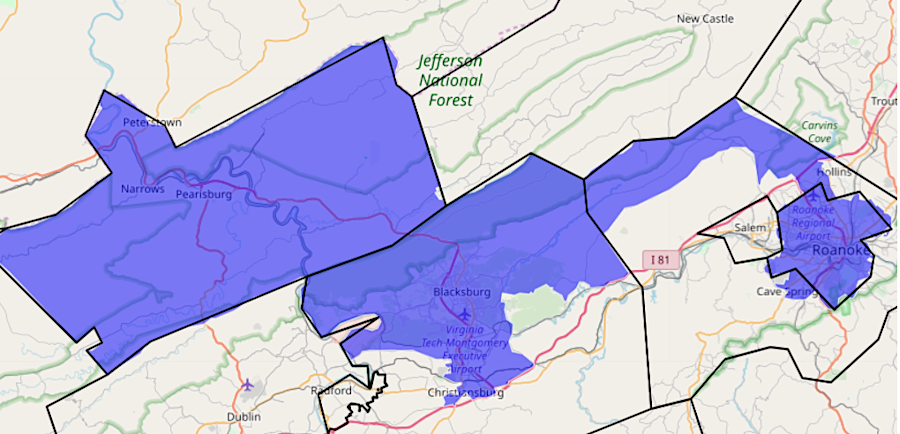
gerrymandered State Senate District 21 (the Johnnymander) was eliminated in 2021 by the non-partisan redistricting of the Virginia Supreme Court
Source: ZipDataMaps, Map of Virginia State Senate District 21 Border
The assumption that elections are decided by "swing" voters, willing to support Democrats in some elections and Republicans at other times, was questioned by Professor Larry Sabato in 2021. He noted that in presidential elections between 1952 and 1992, 20% of voters had been willing to vote for a candidate of either party. Between 2008-2020, that dropped to just 10% as the electorate became more polarized. Candidates paying attention to his analysis might conclude their priority was to appeal to their base, energizing them to get out the vote, rather than appearing as a moderate who might peel off voters from the other party.
If demographics reflect destiny, in 2022 Sabato ranked Virginia as one of the top 10 states likely to support Democratic candidates. He used three demographic indicators - percentage of residents 25 or older with a bachelor's degree, percentage of white residents, and level of urbanization - to identify the most-Republican and most-Democratic states. Based on those three factors, Sabato calculated that the partisan lean of Virginia was similar to Colorado, Rhode Island, and Illinois.43
Sabato also identified how by 2022 the pattern of modern voting had created "blowout counties," where the candidate of one party won 80% or more of the vote:44
- In 2012, there was just one jurisdiction in the state won by blowout proportions, the heavily Black city of Petersburg, which Barack Obama carried with 90% of the major-party vote. With Trump on the ballot in 2016, there were 14 jurisdictions in the Old Dominion that were won with at least 80% of the vote, a number split between the 2 parties. In 2016, the breakdown of sorted jurisdictions in Virginia was 8 for Trump and 6 for Hillary Clinton. In 2020, it was 10 for Trump and 6 for Biden.
- Still, all of Trump's super landslide counties in 2020 were clustered in Virginia's lightly populated, mountainous western panhandle, heavily Republican now but once so fiercely competitive that the congressional district was dubbed "the Fighting Ninth." Meanwhile, Biden's half-dozen blowout jurisdictions were sprinkled around the state, 3 in suburban Northern Virginia (the city of Alexandria, Arlington Co., and the city of Falls Church), 2 in the Richmond area (the cities of Richmond and Petersburg), plus the city of Charlottesville (home of the University of Virginia).
- These half-dozen jurisdictions produced a plurality for Biden of nearly 250,000 votes, while the margin in Trump's 10 super landslide counties was barely 70,000. In short, the 80% counties helped to build Biden's advantage in Virginia considerably (450,000 votes statewide).
Sabato's analysis was most relevant for statewide races. After the non-partisan redistricting of the 140 General Assembly districts by the Virginia Supreme Court in 2021, the Virginia Public Access Project calculated that there were seven "competitive" districts. The 2023 General Election ended with Democrats in control of the two legislative houses by very narrow margins, 51-49 in the House of Delegates and 21-19 in the State Senate.
The margin of victory in 2023 may have been tied to the swing voters who cared most about reproductive rights. Virginia was the only Southern state that had not imposed new limits on abortion access after the US Supreme Court overturned Roe v. Wade in 2022.
Governor Youngkin and his Spirit of Virginia political action committee campaigned hard on a proposal to ban most abortions after 15 weeks, rather than the current Virginia law of 26 weeks - and longer, if approved by three doctors. Republicans won races in swing districts in 2023, but the post-election assessment was that the heavy emphasis on the abortion issue had been counterproductive with enough voters to cost the Republican Party control of the state legislature.

swing voters in suburban districts who cared most about reproductive rights helped determine results of the 2023 General Assembly elections
Source: National Archives, Photograph of Women Holding Banner, :If Men Got Pregnant Abortion Would be Sacred" at the National Women's Conference
The loss led to a post-election contest for the leadership of the Republican caucus in the House of Delegates by those who felt the governor's strategy had not been coordinated well with candidates running in the close districts. Unhappy members of the caucus complained that more successful campaign issues, including crime and parental rights in schools, had been drowned out. Voters concerned about protecting a woman's right to choose had been mobilized, and those swing voters had determined the 2023 election results.
House Speaker Todd Gilbert successfully defended his leadership position in the caucus. Because Democrats had won 51 of the seats in the House of Delegates, Gilbert would serve for the next two years as the Minority Leader.
The 2023 election left political power in Virginia split between the two parties, again. The closeness of the final results, with Democrats taking control of the House of Delegates and State Sente by only on seat in each house, was matched by the closeness of the total vote. Total Democratic votes for the 40 seats in the State Senate were only 0.5% higher than votes for Republican candidates. In the 100 races for House of Delegates seats, the difference was only 0.7%.
That contrasted with the 2020 presidential election in which Democratic candidate Joe Biden defeated Republican candidate Donald Trump by 10%. After the 2023 election, commentators categorized Virginia as a "purple" state rather than reliably "blue" or "red."
The trend in the Richmond suburbs after 2015 has been for increased support for Democratic candidates, mimicking the pattern in the Northern Virginia suburbs after 2000. In 2017, for the first time since 1961, Chesterfield County supported the Democratic candidate for Governor. Chesterfield County voters supported a Democratic candidate for president in 2020 for the first time since Harry Truman ran in 1948. The purple county voted for Glenn Youngkin, the Republican candidate for Governor in 2021, but in 2023 Democrats won a majority on the local Board of Supervisors for the first time in the 21st Century.
Voters in towns with universities and colleges have also been moving into the Democratic column, even in the regions of Virginia that are strongly Republican. More than just students are choosing to support Democratic candidates. Schools are transferring research effectively to the private sector, and new businesses near universities are hiring new workers that also appear to be increasing the Democratic vote.
In 2023, the deadline for voter registration was shifted to Election Day rather than in mid-October. Allowing people to register and vote on the same day increased voter participation. The record number of Virginia Tech students participating in the 2023 election may have led to the defeat of several Republican candidates seeking Montgomery County offices. In response, Republicans citing concerns about voting integrity have searched for ways to limit the opportunities for students to register and vote.45
Since the demise of the Byrd Organization and the success of the Republican Party in winning elections in the 1990's, only rarely has one party "won the trifecta" and controlled at the same time the office of governor and both houses of the General Assembly. Republican had a majority in both houses of the General Assembly plus a Republican Governor in 2000-2001. Since Governor Wilder's term, Democrats have controlled both the executive and legislative branches of state government only in 2020-2021.
An experienced political commentator, Bob Lewis, noted after the 2023 elections:46
- So for at least the next few years, a diminished Youngkin will propose and the Democratic legislature will dispose. Each will frustrate and obstruct the other. The adversarial process will assure a Goldilocks outcome, preventing passage of anything too left or too right.
- And, as Virginians made clear on Tuesday, we're OK with that.
The Republican Party success in Virginia was tied to its ability to get out the vote in the rural jurisdictions which were overwhelmingly supportive of that party's candidates. Support in rural areas for Democratic Party candidates did not decline significantly between 2008 to 2020; Democrats continued to receive about the same number of total votes. However, Republican votes increased substantially, even in counties where the overall population was declining.
As described in a Cardinal News analysis:47
- It's not that Democratic voters converted to Republican ones (although some may have), it's that Republicans have produced new voters in a place where few thought they could be found. We see this over and over across rural Virginia. In Campbell County, the Democratic vote from 2008 to 2020 dropped by just 21. Democrats are just as numerous in Campbell as they always have been. However, the Republican vote in that time grew by 3,801, even though the county's overall population barely changed.
In addition, a poll before the 2024 election indicated that among unregistered voters, 40% were Donald Trump supporters while less than 20% were supporters of Kamala Harris. Though traditionally the Democratic Party in Virginia had emphasized increasing voter participation by expanding early voting and reducing registration barriers, the poll suggested that the Republican Party would benefit more if a higher percentage of Virginians decided to vote.
In advance of the start of early voting for the 2024 election, Gov. Glenn Youngkin toured in Southside Virginia and emphasized the need for Republicans to roll up large majorities there:48
- The way to win elections in Virginia is to blow out the vote in Altavista... We must win Bedford with 80% of the vote... When we do that we can overcome the other parts of Virginia.
For partisan races, Virginia ballots use one or two letters to indicate a candidate's political party. When an activist against police violence formed the Liberation Party in 2021, the Virginia Department of Elections debated how to identify it on the ballot. "L" was already used for Libertarian candidates, so "LP" was adopted as the official abbreviation for the Liberation Party.49

ballots identify candidates in partisan races as D (Democrat) and R (Republican)
Source: Loudoun County, Sample Ballot - November 8, 2022
Leaders of the Libertarian Party in Virginia moved to dissolve the statewide organization in 2022. The party's central committee voted 7-6-1 to return the $30,000 in the bank account to donors, because the Mises Caucus in the nationwide Libertarian Party had adopted hard-right policies inconsistent with beliefs in individual choice.50
National officials contested the effort to dissolve, and the Virginia Libertarian Party reorganized under new leadership. In 2023 it had two candidates on the ballot for the 13th District and 70th District House of Delegates seats, plus one candidate for the 2nd District State Senate seat.
For the 2024 presidential election, the Libertarian Party nominated Chase R. Oliver for President and Mike ter Maat for Vice-President. They received almost 20,000 votes, which was 0.44% of the total. There were three other third-party candidates on Virginia's ballot for President in 2024. The Green Party won 0.77%. Two independent candidates won 0.20% and 0.19% of the total votes.51



three Libertarian candidates were on the 2023 ballot
Source: Virginia Department of Elections, 2023 November General and Special Elections
In 2025, the Democratic Party managed to recruit enough candidates to have someone on the ballot in all 100 House of Delegates districts. Republicans had candidates in 70 of the districts; 30% of the seats were left uncontested. There were Democratic primaries for party nomination in nine districts and Republican primaries in eight. In only two districts out of 100 were there simultaneous primaries for the party nominations.
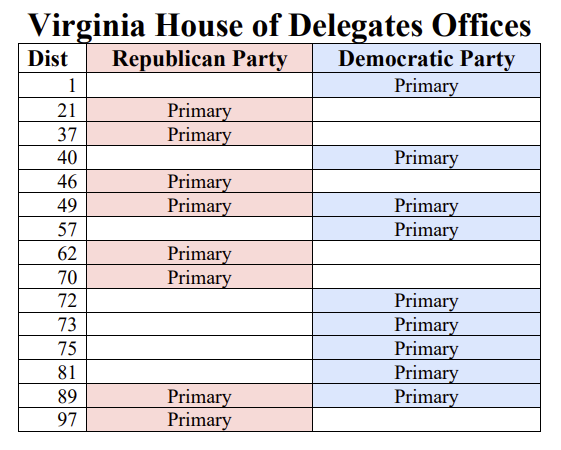
there were primaries for nomination to 2025 House of Delegates races in less than 10% of the 100 districts
Source: Virginia Department of Elections, 2025 June Primary Elections
The last slot to be filled was for the 100th District, primarily on the Eastern Shore. It was a reliably-Republican district and the incumbent Republican delegate had won in 2023 with 60% of the vote. Political observers suggested that fielding candidates even in highly-partisan districts where victory was unlikely would increase vote totals for that party's statewide candidates, which in 2025 included races for Governor, Lieutenant Governor, and Attorney General.
The optimistic Democratic challenger on the Eastern Shore said:52
- Nobody else had put their hat in the ring, so I said, it can't go uncontested. This guy has to have at least somebody playing a little defense against him. If nobody else is going to step up and do it, I will gladly.
His announcement stimulated another candidate to run in that district. A primary was avoided by the first candidate dropping out. Attracting two Democratic candidates to run in the 100th District, where the Republican was heavily favored to win the seat in the House of Delegates, demonstrated the high level of interest in the November 2025 election cycle.
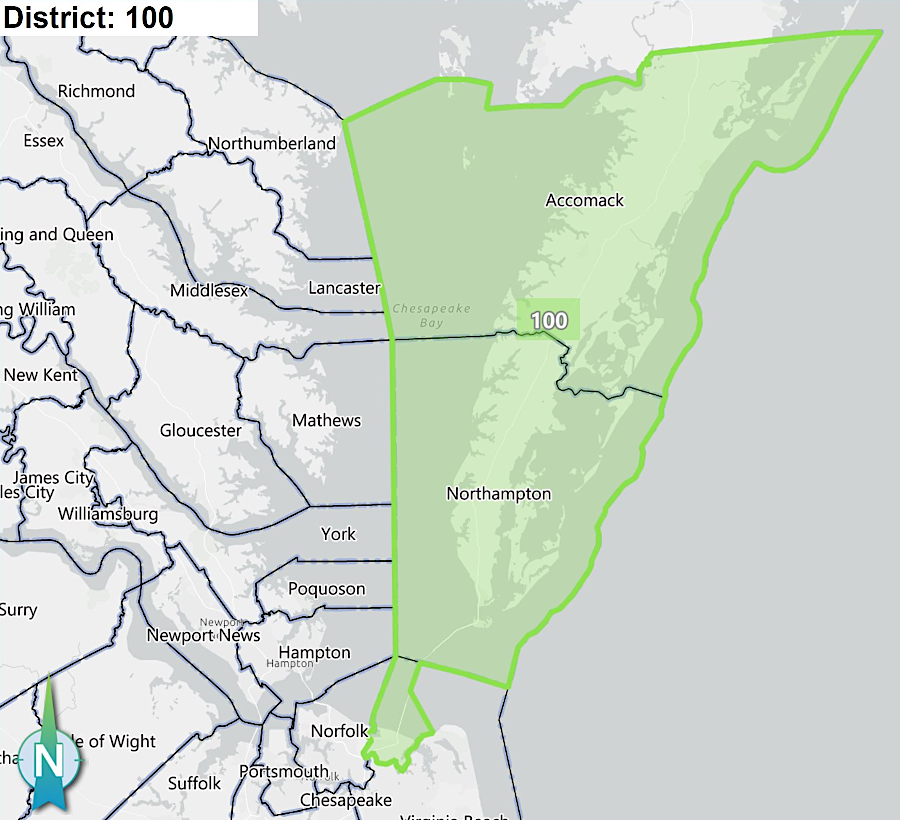
in 2025 the Democratic Party fielded candidates in every House of Delegates race, including the 100th District
Source: Virginia House of Delegates, 100th District
Paul Goldman, former chair of the Virginia Democratic Party, predicted a Democratic sweep in November 2025 based on the election of President Trump in 2024:53
- The two-party system in Virginia began in 1977. In the ensuing years, one consistent, predictive fact stands out: The gubernatorial candidate for the party of the sitting president has never received 50% of the vote. Ever. The gubernatorial candidate of the sitting president's party has lost every election except in 2013 due in good measure to the contest featuring a three-way. The only time the winner got less than 50%.
- ...In my view, Spanberger can't lose unless she runs the worst gubernatorial campaign in the modern era. Historical statistical analysis says she should win by between 6 to 10 percentage points, if not more. In doing so she will sweep in the Democratic ticket unless one of her running mates has a fatal flaw.
The Democrats swept the elections on November 4, 2025. They captured all three statewide seats, plus 13 of the 14 House of Delegates seats which the party had targeted. The election increased the party's control of the House of Delegates from a 51-49 ratio to a 64-36 majority.
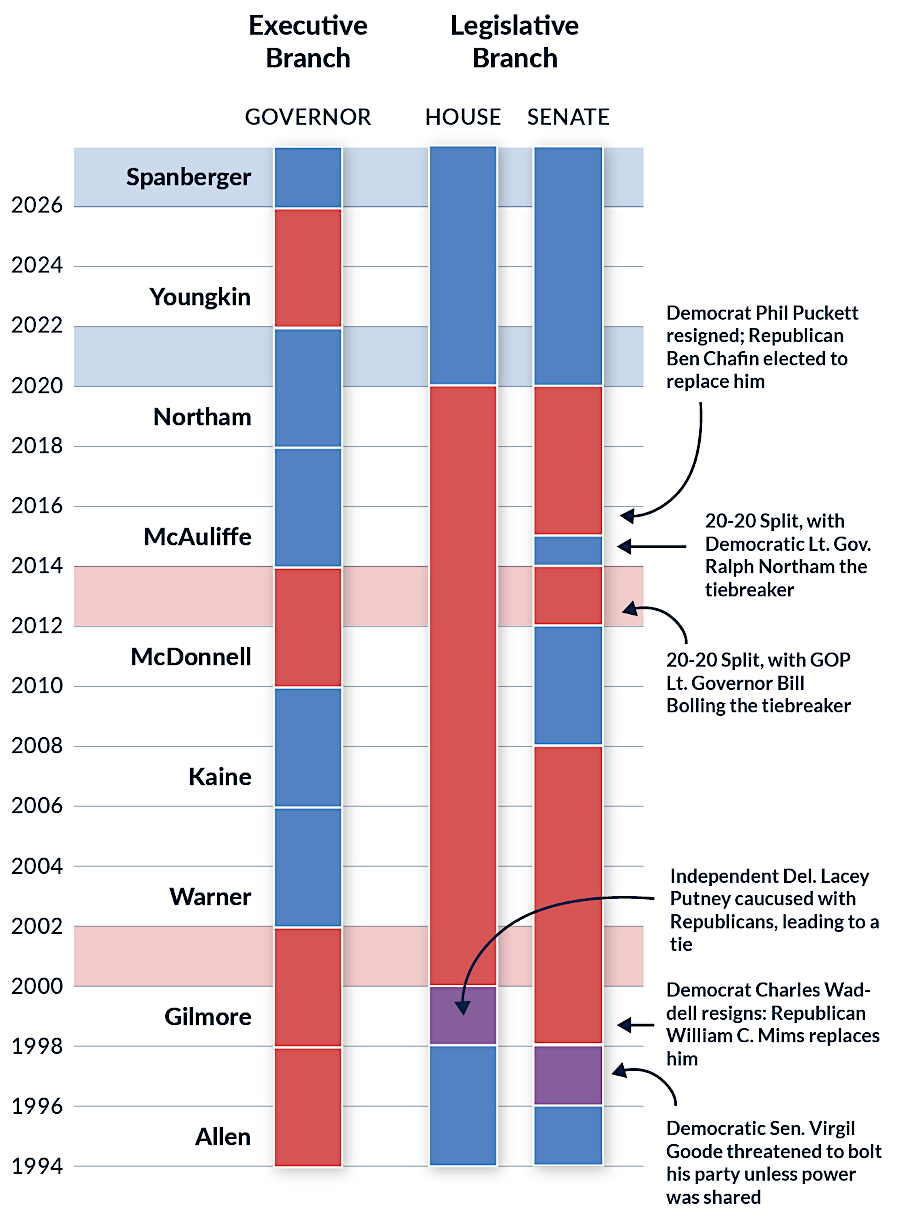
the 2025 elections gave the Democratic Party control of both houses in the General Assembly and the three statewide offices in the Executive Branch
Source: Virginia Public Access Project (VPAP), Democrats Win Control of Executive Branch
Downsizing of the Federal government by President Trup in his second term mobilized many voters, and many commentators noted how he had stimulated the Democratic "blue tsumami." In nine Northern Virginia jurisdictions, home of many Federal workers, Spanberger won over 72% of the vote. In the rest of Virginia, her victory margin of 51% was much thinner.
Pundits also allocated blame to the gubernatorial candidate, Winsome Earl-Sears. She failed to attend meetings with key interest groups, and the number of public engagements on her campaign schedule were surprisingly few in regions where she was expected to mobilize voters to cast a ballot.
In nearly every jurisdiction, the percentage of Republican voters dropped in comparison to the 2021 election for governor. The steady decline of the Democratic percentage of the vote in rural areas was reversed in 2025 because reliable Republicans there did not choose to vote. Statewide, the Republican vote for governor dropped by nearly 14% compared to 2021 while the Democratic vote increased by 20%.
Spanberger won with 57% of the total because so many Republicans chose to sit out the 2025 election. The state's most populous county, Fairfax County, produces more Republican votes than any other jurisdiction. In that county, where Federal job cuts were a significant issue, the Republican vote declined by 25% compared to 2021. The drop-off was even higher in Alexandria, Arlington, and Falls Church.
The Republican vote in Virginia Beach was 15% lower in 2025. That city, with the third-highest population of local jurisdictions after Fairfax and Prince William counties, had supported Republican candidate Glenn Youngkin in 2021. In 2025, it gave Democratic candidate Abigail Spanberger 55% of the vote. Not since the 1961 governor's race had a Democrat won such a large percentage in Virginia Beach.
Lynchburg, home of Liberty University, gave a Democratic candidate for governor a majority for the first time in 20 years. Spanberger won in Spotsylvania County, the first time a Democrat had gathered a majority there in 40 years. The Democratic candidate for governor won in Stafford County for the first time in the 21st Century.
The Republican candidate at the top of the ticket did not mobilize her supporters to vote, and that enabled downballot Democrats to win. Despite incindiary text messages sent years earlier by the Democratic candidate for Attorney General hoping that the Republican Speaker of the House of Delegates "gets two bullets to the head," Jay Jones won with 53% of the vote.
Despite population growth in Virginia, the Republican incumbent Attorney General received 5% fewer votes in 2025 compared to 2021. He received 125,000 more votes than the Republican candidate for governor in 2025, but needed to get 320,000 more votes to win his race.
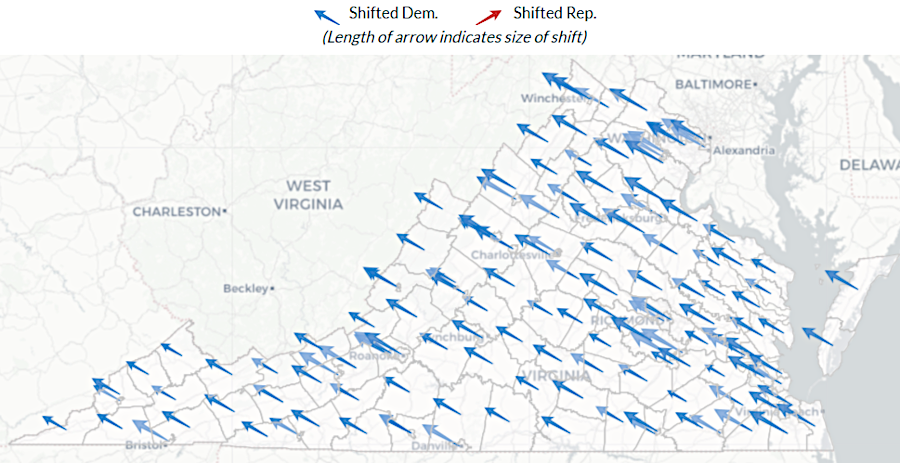
low Republican turnout in 2025 helped Democrats flip 13 seats in House of Delegates races and win all three statewide races
Source: Virginia Public Access Project (VPAP), Change in Party Performance: 2021 vs. 2025 Gubernatorial
Winsome Earl-Sears campaigned on "hot button" social issues, such as keeping children born as biological males out of girl's bathrooms and off of girl's sports teams at schools. Abigal Spanberger focused on affordability issues and how President Trump threatened democracy. A former Republican Lieutenant Governor, Bill Bolling, said:54
- Sears ran a bad campaign. I don't know who her political consultants were, but whoever told Sears to run a campaign based on cultural issues like the transgender issue was guilty of political consulting malpractice. Sears should have tied herself to the hip of Glenn Youngkin and talked about economic issues - jobs, inflation, the cost of living, etc. That may not have helped her win given the other challenges she faced, but it might have helped.
Even with the success of the Democratic Party in 2025, it still elected just two members to the House of Delegates from west of the Blue Ridge. Sam Rasoul retained his 38th District seat in Roanoke, while Lily Franklin flipped the 41st District seat centered in Montgomery and Roanoke counties. The Democratic candidate for governor did win a majority of votes in Montgomery County and in several cities west of the Blue Ridge, including Radford, Roanoke, Lexington, Staunton, Waynesboro, Harrisonburg, and Winchester.55
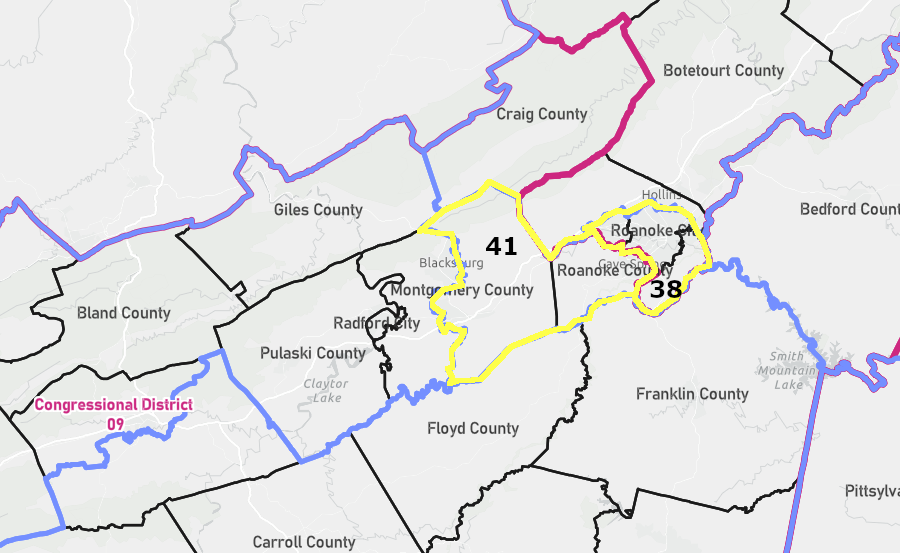
only 2 of the 64 Democrats elected to the House of Delegates in 2025 came from districts west of the Blue Ridge
Source: Virginia Department of Elections, Interactive Map of Voting Districts and Precinct Boundaries
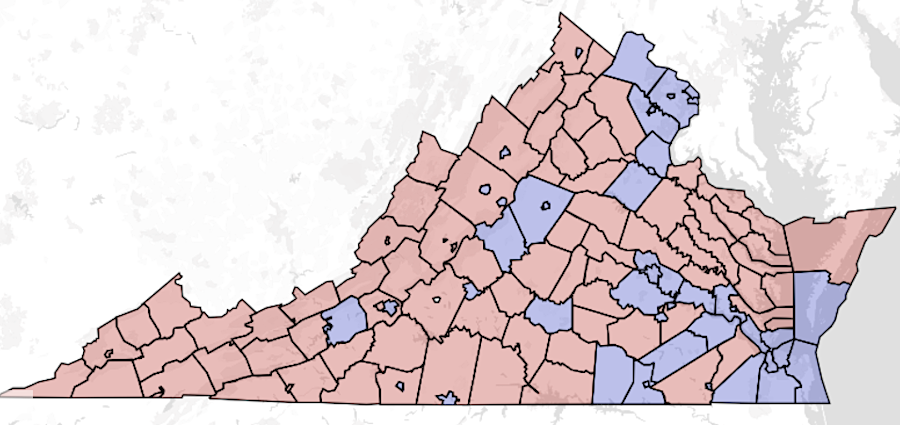
west of the Blue Ridge, the Democratic candidate for governor in 2025 won in Montgomery County and in several cities
Source: Virginia Department of Elections, 2025 November General
Links
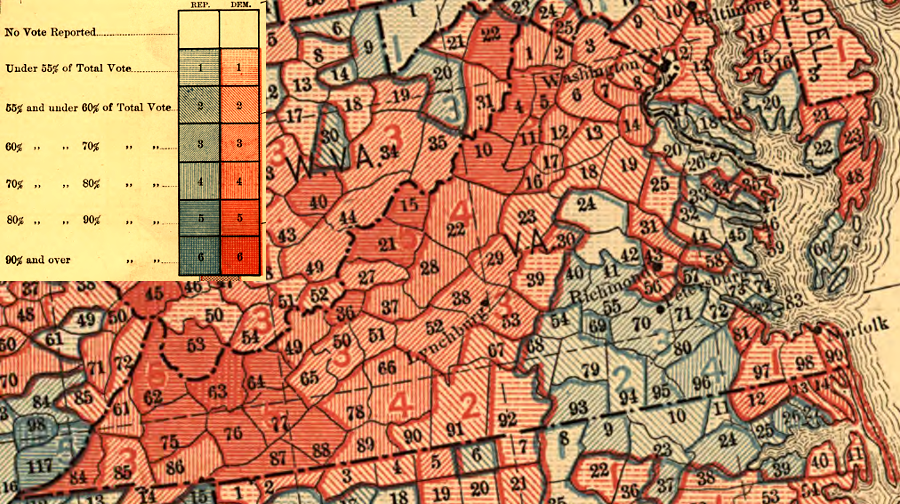
in the 1880 election, the Republican candidate (James A. Garfield) got less than 40% of the votes in Virginia, and they were concentrated in Southside and on the Northern Neck where the percentage of black voters was highest
Source: Library of Congress, "Scribner's Statistical Atlas of the United States," Plate 11: Popular Vote: 1880
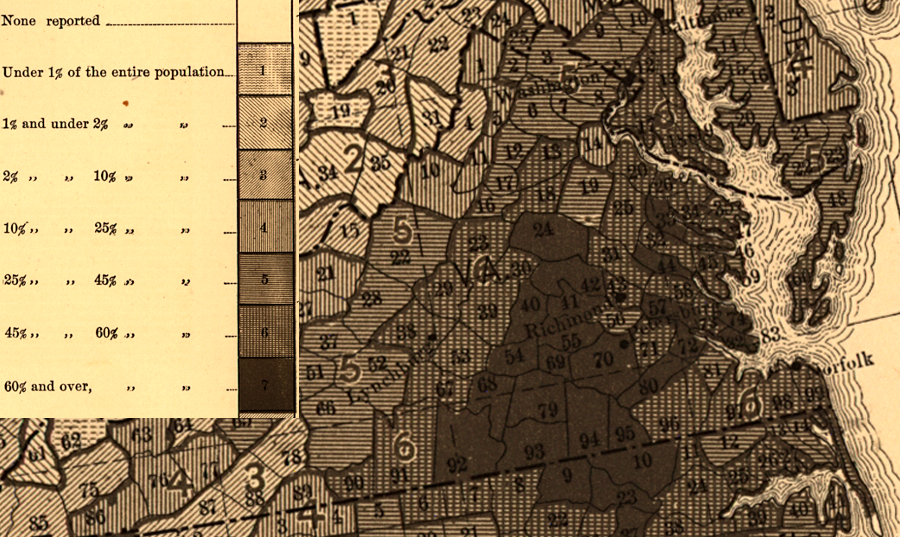
the concentration of the "colored population" in 1880 explains the percentage of votes for the Republican Party, which had ended slavery
Source: Library of Congress, "Scribner's Statistical Atlas of the United States," Plate 24: Population (Colored Population)
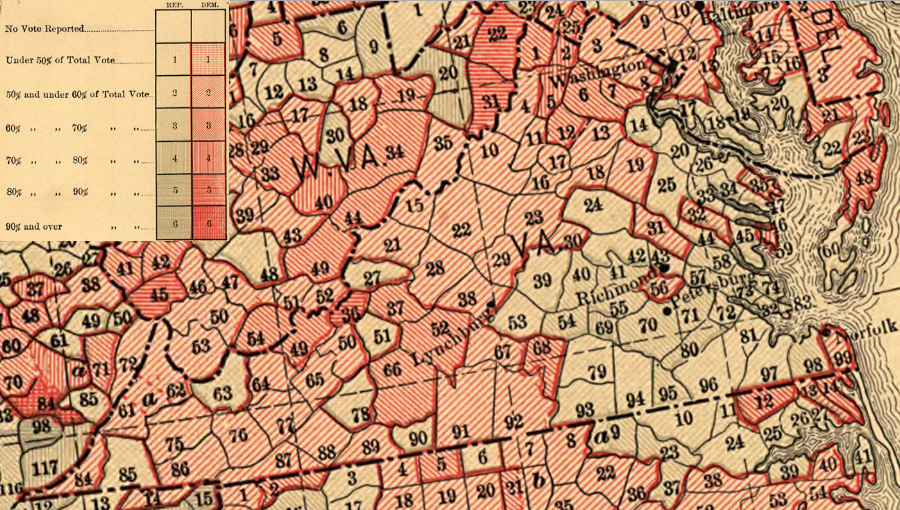
in the 1884 election, the Republican candidate (James A. Garfield) got 49% of the votes in Virginia, and won several counties west of the Blue Ridge
Source: Library of Congress, "Scribner's Statistical Atlas of the United States," Popular Vote: 1884

in the 1888 election, the Republican candidate (Benjamin Harrison) lost to Grover Cleveland
Source: Library of Congress, "Scribner's Statistical Atlas of the United States," Popular Vote: 1888
References
1. "Farewell Address, 19 September 1796," Founders Online, National Archives, https://founders.archives.gov/documents/Washington/05-20-02-0440-0002 (last checked May 6, 2024)
2. "Byrd Leaves Party in Virginia Over Democratic Loyalty Oath," New York Times, March 18, 1970, https://www.nytimes.com/1970/03/18/archives/byrd-leaves-party-in-virginia-over-democratic-loyalty-oath-byrd.html; "A Last Word on Virginia," Sabato's Crystal Ball, Center for Politics, University of Virginia, November 1, 2021, https://centerforpolitics.org/crystalball/articles/a-last-word-on-virginia/; "Schapiro: 2 lives still shaped by Kennedy's death," Richmond Times-Dispatch, November 22, 2023, https://richmond.com/opinion/columnists/president-john-f-kennedy-assassination-60-years-dallas-virginia-texas/article_78ec882a-8563-11ee-a86d-2339d8666e36.html; "United States presidential elections in Virginia," Wikipedia, https://en.wikipedia.org/wiki/United_States_presidential_elections_in_Virginia (last checked November 22, 2023)
3. "Two-Time Va. Gov. Mills Godwin Dies," Washington Post, February 1, 1999, https://www.washingtonpost.com/archive/local/1999/02/01/two-time-va-gov-mills-godwin-dies/7cd7dab1-8e64-4ea1-8cbf-ff0d92675f6a/; James R. Sweeney & the Dictionary of Virginia Biography, "Mills E. Godwin (1914-1999)," Encyclopedia Virginia, December 19, 2016, http://www.EncyclopediaVirginia.org/Godwin_Mills_E_1914-1999; Frank B. Atkinson,
The Dynamic Dominion: Realignment and the Rise of Two-party Competition in Virginia, 1945-1980, Rowman & Littlefield, 2006, p.305, https://books.google.com/books?id=vHBBBSxSJg0C (last checked March 17, 2019)
4. "Democrats happy with election results," Potomac News, http://potomacnews.com/servlet/Satellite?pagename=WPN%2FMGArticle%2FWPN_BasicArticle&c=MGArticle&cid=1128768060524&path=!news, November 10, 2005; "A Triumph For Warner, And a Guide For His Party," The Washington Post, November 9, 2005, http://www.washingtonpost.com/wp-dyn/content/article/2005/11/08/AR2005110802241_2.html (last checked November 11, 2005)
5. "After thrills of wave election, Virginia's freshmen Democrats see most of their bills die in GOP-controlled House," Richmond Times-Dispatch, February 17, 2018, http://www.richmond.com/news/virginia/government-politics/general-assembly/after-thrills-of-wave-election-virginia-s-freshmen-democrats-see/article_dc818fbf-6fbd-5018-ba20-b009f10b63e6.html; "2018 November General," Virginia Department of Elections, https://results.elections.virginia.gov/vaelections/2018%20November%20General/Site/Congress.html (last checked November 12, 2018)
6. "Republicans haven't won statewide in Virginia since 2009. Tuesday's Senate primary shows why," CNN, June 9, 2018, https://www.cnn.com/2018/06/09/politics/virginia-republicans-senate-primary/index.html (last checked June 11, 2018)
7. "Fairfax sees rare primary battle for board chair amid political transformation," Washington Post, January 26, 2019, https://www.washingtonpost.com/local/virginia-politics/fairfax-sees-rare-primary-battle-for-board-chair-amid-political-transformation/2019/01/25/a47471f2-19c9-11e9-88fe-f9f77a3bcb6c_story.html
8. "The lonely battle of the last Republican lawmaker from northern Virginia," Washington Post, November 1, 2019, https://www.washingtonpost.com/local/virginia-politics/the-lonely-battle-of-the-last-republican-lawmaker-from-northern-virginia/2019/10/30/2297494c-f4f8-11e9-8cf0-4cc99f74d127_story.html; "'Absolutely fundamental': How women have emerged as a force in Virginia politics," Washington Post, November 1, 2019, https://www.washingtonpost.com/local/virginia-politics/absolutely-fundamental-how-women-have-emerged-as-a-force-in-virginia-politics/2019/11/01/dd6e26e4-fbe9-11e9-8190-6be4deb56e01_story.html (last checked November 2, 2019)
9. "Commentary: A changing Virginia - and an unchanging Republican Party," Free Lance-Star, November 10, 2018, https://www.fredericksburg.com/opinion/columns/commentary-a-changing-virginia---and-an-unchanging-republican/article_1606c6b8-6f27-5522-b65b-0844740e4a43.html (last checked November 12, 2018)
10. "Legislative Candidates: Ebb and Flow," Virginia Public Access Project (VPAP), https://www.vpap.org/visuals/visual/number-major-party-legislative-candidates/; "Federal judges choose Va. redistricting map favorable to Democrats; six GOP House districts would get bluer," Washington Post, January 23, 2019, https://www.washingtonpost.com/local/virginia-politics/federal-judges-choose-va-redistricting-map-favorable-to-democrats-six-gop-house-districts-would-get-bluer/2019/01/22/401b2618-1ebc-11e9-9145-3f74070bbdb9_story.html, "How Court Plan Would Affect Partisan Lean of Some House Districts," Virginia Public Access Project, https://www.vpap.org/updates/3177-how-court-plan-would-partisan-lean-some-house-districts/; "Court picks Virginia redistricting plan that helps Democrats," The Virginian-Pilot, January 23, 2019, https://pilotonline.com/news/government/politics/nation/article_56bb2f1c-6b2d-5a9e-bdcf-476fcfd5a7c5.html; "425,000 New Voters," Virginia Public Access Project, https://www.vpap.org/visuals/visual/425000-new-voters/ (last checked July 4, 2019)
11. "Democrats flip Virginia Senate and House, taking control of state government for the first time in a generation," Washington Post, November 5, 2019, https://www.washingtonpost.com/polls-open-in-virginia-balance-of-power-in-state-government-is-at-stake/2019/11/05/bdb57972-ff5b-11e9-8501-2a7123a38c58_story.html; "Why Democrats care about Virginia's normally sleepy House of Delegates races," Washington Post, November 1, 2017, https://www.washingtonpost.com/local/virginia-politics/why-democrats-care-about-virginias-normally-sleepy-house-of-delegates-races/2017/11/01/84dd49e0-b8cc-11e7-a908-a3470754bbb9_story.html; "Election 2019: Another Win For Democrats In Virginia Pushes State Further Off The Competitive Map," Sabato's Crystal Ball, University of Virginia Center for Politics, November 7, 2019, http://www.centerforpolitics.org/crystalball/ (last checked November 12, 2019)
12. "Election Results, US Senate 2018, Virginia Public Access Project, https://www.vpap.org/electionresults/20181106/ussenate/maps/; "Republicans wake to a blue Virginia," Washington Post, November 6, 2019, https://www.washingtonpost.com/local/virginia-politics/republicans-wake-to-a-blue-virginia/2019/11/06/241923dc-0004-11ea-8bab-0fc209e065a8_story.html; "Prince William board flips Democratic; Wheeler to succeed Stewart as board chair," Washington Post, November 5, 2019, https://www.washingtonpost.com/local/virginia-politics/prince-william-election-democrat-wheeler-will-succeed-stewart-as-board-chair/2019/11/05/536c1508-fcb3-11e9-ac8c-8eced29ca6ef_story.html (last checked November 6, 2019)
13. "Republicans in Virginia are toast - because they toasted themselves," Washington Post, November 6, 2019, https://www.washingtonpost.com/opinions/republicans-in-virginia-are-toast--because-they-toasted-themselves/2019/11/06/ede38512-00cd-11ea-8bab-0fc209e065a8_story.html (last checked November 7, 2019)
14. "'Almost irrelevant': Virginia Republicans take stock of electoral losses," Washington Times, November 6, 2019, https://www.washingtontimes.com/news/2019/nov/6/virginia-republicans-take-stock-electoral-losses-d/ (last checked November 7, 2019)
15. "Election lessons 2019: Key takeaways for a changing county," Chesterfield Observer, November 13, 2019, https://www.chesterfieldobserver.com/articles/election-lessons-2019-key-takeaways-for-a-changing-county/ (last checked November 14, 2019)
16. "Democrat Cheryl Turpin concedes to Republican Jen Kiggans," The Virginian-Pilot, November 7, 2019, https://www.pilotonline.com/government/elections/vp-nw-elx-turpin-concedes-20191107-bxvbe5pplzdpheoio3qgd5rhiu-story.html; "2019 November General - Unofficial Results," Virginia Department of Elections, https://results.elections.virginia.gov/vaelections/2019%20November%20General/Site/GeneralAssembly.html; "As state turns blue, Chesterfield GOP wins big," Chesterfield Observer, November 6, 2019, https://www.chesterfieldobserver.com/articles/as-state-turns-blue-chesterfield-gop-wins-big/; "His majority got wiped out in the suburbs. How did Kirk Cox survive?," Virginia Mercury, November 8, 2019, https://www.virginiamercury.com/2019/11/08/his-majority-got-wiped-out-in-the-suburbs-how-did-kirk-cox-survive/; "Editorial: Virginia's blue wave washes out locally," The Virginian-Pilot, November 8, 2019, https://www.pilotonline.com/opinion/vp-ed-editorial-local-elections-1108-20191108-47sjzylwszdf5pprch6rid3ag4-story.html; "Audio: 'After Virginia Votes' Reviews 2019 Virginia Elections," Blue Virginia blog, November 13, 2019, https://bluevirginia.us/2019/11/audio-after-virginia-votes (last checked January 18, 2020)
17. "In race for Virginia's next governor, two Chesterfield lawmakers vie for the soul of the GOP," Chesterfield Observer, November 18, 2020, https://www.chesterfieldobserver.com/articles/in-race-for-virginias-next-governor-two-chesterfield-lawmakers-vie-for-the-soul-of-the-gop/ (last checked November 20, 2020)
18. "Republican Requiem," Alexandria Gazette Packet, November 6, 2019, http://www.alexandriagazette.com/news/2019/nov/06/republican-requiem-virginia/; "Editorial: The many ironies in Virginia's 2021 Democratic primary," The Roanoke Times, April 24, 2021, https://roanoke.com/opinion/editorial/editorial-the-many-ironies-in-virginias-2021-democratic-primary/article_29c83cd6-97cb-11eb-a074-4fbfbc956a41.html; "Only one party lets voters vote," The Roanoke Times, April 24, 2021, https://roanoke.com/opinion/columnists/swecker-early-voting-is-starting-but-only-one-party-is-letting-virginians-vote/article_71a5a372-9d39-11eb-ac3d-6fd83d169694.html (last checked April 28, 2021)
19. "Suburban voters were key to Democratic takeover in Virginia - and both parties will need to keep wooing them," The Virginian-Pilot, November 9, 2019, https://www.pilotonline.com/government/virginia/dp-nw-elx19-suburban-issues-20191108-ia3xkazyd5gcdpshh54vwy25ay-story.html (last checked November 10, 2019)
20. "Republicans wake to a blue Virginia," Washington Post, November 6, 2019, https://www.washingtonpost.com/local/virginia-politics/republicans-wake-to-a-blue-virginia/2019/11/06/241923dc-0004-11ea-8bab-0fc209e065a8_story.html (last checked November 6, 2019)
21. James Bacon, "Republicans Must Find a New Way Forward," Bacon's Rebellion, November 6, 2019, https://www.baconsrebellion.com/wp/republicans-must-find-a-new-way-forward/#more-53676 (last checked November 6, 2019)
22. Don Rippert, "Virginia Republicans Reap What They Have Sown," Bacon's Rebellion, November 6, 2019, https://www.baconsrebellion.com/wp/virginia-republicans-reap-what-they-have-sown/#more-53675 (last checked November 6, 2019)
23. "The Daily 202: Republicans get blown out in the suburbs - again - in off-year elections," Washington Post, November 6, 2019, https://www.washingtonpost.com/news/powerpost/paloma/daily-202/2019/11/06/daily-202-republicans-get-blown-out-in-the-suburbs-again-in-off-year-elections/5dc2477588e0fa10ffd20bc7/ (last checked November 6, 2019)
24. "A kinder, gentler Todd Gilbert? 'It depends on the day and the issue'," Virginia Mercury, November 19, 2019, https://www.virginiamercury.com/blog-va/a-kinder-gentler-todd-gilbert-it-depends-on-the-day-and-the-issue/; "Our 2019 Recommendations," Suburban Virginia Republican Coalition, https://suvgop.com/report-recommendations; "Democrats look to history as Virginia's General Assembly opens its session," Washington Post, January 8, 2010, https://www.washingtonpost.com/local/virginia-politics/democrats-look-to-history-as-virginias-general-assembly-opens-its-session/2020/01/08/a511ad86-31b1-11ea-a053-dc6d944ba776_story.html (last checked January 9, 2020)
25. "Incumbent Defeats," Virginia Public Access Project, November 12, 2019, https://www.vpap.org/visuals/visual/defeated-incumbents/ (last checked November 12, 2019)
26. "Registration/Turnout Reports," Virginia Department of Elections, https://www.elections.virginia.gov/resultsreports/registrationturnout-statistics/; "Graphics: Virginia Voter Turnout Was Nearly 40% in 2019, Up Sharply from 29% in 2015," Blue Virginia blog, November 7, 2019, https://bluevirginia.us/2019/11/graphics-virginia-voter-turnout-was-nearly-40-in-2019-up-sharply-from-29-in-2015; "In Virginia's General Assembly races, turnout is paramount," Washington Post, September 11, 2019, https://www.washingtonpost.com/opinions/2019/09/11/virginias-general-assembly-races-turnout-is-paramount/; Rachel Bitecofer, "High Stakes in Virginia General Assembly Election will Preview 2020 Presidential," Judy Ford Wason Center for Public Policy, Christopher Newport University, September 10, 2019, http://cnu.edu/wasoncenter/2019/09/10-va-2019-legislative-forecast/; "Is Spanberger up by 4 percentage points or 17? Why two new polls have very different results," Cardinal News, May 23, 2025, https://cardinalnews.org/2025/05/23/is-spanberger-up-by-4-percentage-points-or-17-why-two-new-polls-have-very-different-results/ (last checked May 23, 2025)
27. "Editorial: The numbers to know from the November elections," The Roanoke Times, November 22, 2019, https://www.roanoke.com/opinion/editorials/editorial-the-numbers-to-know-from-the-november-elections/article_984e4f1d-dad9-5a7f-9ec7-02a33172ef27.html (last checked November 24, 2019)
28. "List of Second Amendment sanctuaries in Virginia and where it's being discussed," WSLS, December 19, 2019, https://www.wsls.com/news/local/2019/11/27/list-of-second-amendment-sanctuaries-in-virginia-and-where-its-being-discussed/; "Gibson: Republicans go 'super rural,' Democrats 'super suburban'," The Roanoke Times, December 22, 2019, https://www.roanoke.com/opinion/commentary/gibson-republicans-go-super-rural-democrats-super-suburban/article_fd34aa89-1272-52e8-baa7-0ff5e8f8e84d.html; "VCDL Lobby Day 2020: Monday, January 20, 2020," Virginia Citizens Defense League, https://www.vcdl.org/ (last checked January 7, 2020)
29. "Governor Northam says Second Amendment Sanctuaries won't stop him from pursuing 'common sense' gun legislation," WVEC, December 11, 2019, https://www.13newsnow.com/article/news/politics/governor-northam-on-second-amendment-sanctuaries/291-da6727bc-30ff-43c8-8a4b-6005135632a1; "Prospect of gun control in Virginia draws threats, promise of armed protest," Washington Post, January 5, 2020, https://www.washingtonpost.com/local/virginia-politics/prospect-of-gun-control-in-virginia-draws-threats-promise-of-armed-protest/2020/01/05/7e9b230c-2e38-11ea-bcd4-24597950008f_story.html, "Virginia Republicans see gun rights as the path back to a red commonwealth," Washington Examiner, January 7, 2020, https://www.washingtonexaminer.com/news/virginia-republicans-see-gun-rights-as-the-path-back-to-a-red-commonwealth; "Casey: Don't believe the scaremongering on gun legislation," The Roanoke Times, January 7, 2019, https://www.roanoke.com/news/casey-don-t-believe-the-scaremongering-on-gun-legislation/article_2461b1d9-efb8-5486-b2c8-1aaed13252bb.html (last checked January 7, 2020)
30. "VCU Poll: Slim Majority Support Gun Restrictions," Virginia Public Media, January 7, 2020, https://vpm.org/news/articles/9602/vcu-poll-slim-majority-support-gun-restrictions (last checked January 8, 2020)
31. "Gun debate ends abruptly in Virginia as GOP-controlled legislature adjourns after 90 minutes," Washington Post, July 9, 2019, https://www.washingtonpost.com/local/virginia-politics/gun-debate-hits-full-throttle-in-richmond-as-legislature-convenes/2019/07/09/caf20590-a1d4-11e9-bd56-eac6bb02d01d_story.html (last checked April 14, 2020)
32. "Governor Northam Signs Historic Gun Safety Legislation into Law," Office of the Governor, April 10, 2020, https://www.governor.virginia.gov/newsroom/all-releases/2020/april/headline-856016-en.html; "Virginia: Gov. Northam Signs Gun Control Bills," National Rifle Association Institute for Legislative Action, April 11, 2020, https://www.nraila.org/articles/20200411/virginia-gov-northam-signs-gun-control-bills (last checked April 14, 2020)
33. "Partisan Breakdown of Virginia Vetoes," tweet by VACapitolSquare, April 11, 2020, (last checked April 14, 2020)
34. "Shocker! Conservative slate sweeps to victory, control of Staunton City Council," Augusta Free Press, May 19, 2020, https://augustafreepress.com/shocker-conservative-slate-sweeps-to-victory-control-of-staunton-city-council/; "What happened in Staunton? Massive turnout flips Queen City from blue to red," Augusta Free Press, May 20, 2020, https://augustafreepress.com/what-happened-in-staunton-massive-turnout-flips-queen-city-from-blue-to-red/; "We need to be careful to hold together in Staunton after this bitter election: Hunt," News Leader, May 21, 2020, https://www.newsleader.com/story/opinion/columnists/2020/05/21/we-need-careful-hold-together-staunton-after-bitter-election-hunt/5240904002/; "Staunton's Election Lessons," Bacon's Rebellion blog, May 26, 2020, https://www.baconsrebellion.com/wp/stauntons-election-lessons/; "2020 May City General - Staunton," Virginia Department of Elections, https://results.elections.virginia.gov/vaelections/2020%20May%20City%20General/Site/Locality/STAUNTON%20CITY/Member%20City%20Council%20(STAUNTON%20CITY).html; "Local election wins give Virginia Republicans hope amid Democratic domination of top posts," Washington Examiner, May 26, 2020, https://www.washingtonexaminer.com/news/local-election-wins-give-virginia-republicans-hope-amid-democratic-domination-of-top-posts (last checked May 26, 2020)
35. "No TV ads, no presidential visits: Virginia's era as a swing state appears to be over," Washington Post, September 18, 2020, https://www.washingtonpost.com/local/virginia-politics/virginia-not-a-swing-state/2020/09/18/9741e2e4-f843-11ea-89e3-4b9efa36dc64_story.html (last checked September 19, 2020)
36. "Trump schedules rally in Virginia to reach rural North Carolina," Politico, September 22, 2020, https://www.politico.com/news/2020/09/22/trump-rally-virginia-rural-north-carolina-419911; "Trump to visit blue Virginia - but advisers say he's eyeing North Carolina," Washington Post, September 22, 2020, https://www.washingtonpost.com/local/virginia-politics/trump-to-visit-blue-virginia--but-advisers-say-hes-eyeing-north-carolina/2020/09/22/ec53b322-fcec-11ea-9ceb-061d646d9c67_story.html (last checked September 23, 2020)
37. "Registration/Turnout Reports," Virginia Department of Elections, https://www.elections.virginia.gov/resultsreports/registrationturnout-statistics/ (last checked November 8, 2021)
38. "Virginia Republicans rise from the ashes while Democrats ponder what went wrong," Washington Post, November 6, 2021, https://www.washingtonpost.com/local/virginia-politics/virginia-election-republican-wins/2021/11/06/c4d59932-3db9-11ec-8ee9-4f14a26749d1_story.html; "Behind Virginia Democrats' blue wave of votes was a green wave of money. Some challengers outspent Republican incumbents 14-1 on television," Cardinal News, November 24, 2025, https://cardinalnews.org/2025/11/24/behind-virginia-democrats-blue-wave-of-votes-was-a-green-wave-of-money/ (last checked November 24. 2025)
39. "What's it mean to have a majority leader from Southwest Virginia?," Cardinal News, November 10, 2021, https://cardinalnews.org/2021/11/10/whats-it-mean-to-have-a-majority-leader-from-southwest-virginia/; "While Chesterfield and Virginia Beach flipped, a rural surge carried Youngkin to victory," Richmond Times-Dispatch, November 6, 2021, https://richmond.com/news/state-and-regional/govt-and-politics/while-chesterfield-and-virginia-beach-flipped-a-rural-surge-carried-youngkin-to-victory/article_c6d16e43-00fb-53d9-88ac-60848596b162.html (last checked November 10, 2021)
40. "Chesterfield and Lynchburg hadn't backed a Democrat for president since 1948. Biden changed that," Virginia Mercury, November 5, 2020, https://www.virginiamercury.com/2020/11/05/chesterfield-county-hadnt-backed-a-democrat-for-president-since-1948-biden-changed-that/; "Smyth County sheriff switches to GOP," Bristol Herald-Courier, May 30, 2021, https://heraldcourier.com/elections/smyth-county-sheriff-switches-to-gop/article_37eb51b1-f296-500b-b355-d5a40c804771.html; "How Democrats Are Losing the War for Counties," Larry Sabato's Crystal Ball, University of Virginia Center for Politics, October 13, 2021, https://centerforpolitics.org/crystalball/articles/how-democrats-are-losing-the-war-for-counties/; "Election 2022 highlights the continuing collapse of Democratic Party in rural Virginia," Cardinal News, November 14, 2022, https://cardinalnews.org/2022/11/14/election-2022-highlights-the-continuing-collapse-of-democratic-party-in-rural-virginia/; "Democratic vote is increasing in some rural counties but Republican vote is growing much faster," Cardinal News>, August 30, 2023, https://cardinalnews.org/2023/08/30/democratic-vote-may-be-increasing-in-some-rural-counties-but-republican-vote-is-growing-much-faster/ (last checked September 2, 2023)
41. "Election results put Southwest and Southside Virginia in their weakest position in legislature ever," Cardinal News, November 13, 2023, ; "Republicans Fare Well in Southwest Virginia - Roanoke County Goes All Red," Roanoke Star, November 9, 2023, https://theroanokestar.com/2023/11/09/historic-roanoke-county-goes-all-red/; "For some places in Virginia, divided government hits close to home," Cardinal News, January 16, 2024, https://cardinalnews.org/2024/01/16/some-virginia-localities-have-a-split-personality-in-the-general-assembly/ (last checked January 16, 2024)
42. "Don Scott to become Virginia's first Black House speaker as Hampton Roads' legislators take center stage," The Virginian-Pilot, November 11, 2023, https://www.pilotonline.com/2023/11/11/don-scott-to-become-virginias-first-black-house-speaker-as-hampton-roads-legislators-take-center-stage/ (last checked November 13, 2023)
43. "Ranking the States Demographically, from Most Republican-Friendly to Most Democratic-Friendly," Larry Sabato's Crystal Ball, University of Virginia Center for Politics, February 10, 2022, https://centerforpolitics.org/crystalball/articles/ranking-the-states-demographically-from-most-republican-friendly-to-most-democratic-friendly/ (last checked February 10, 2022)
44. "The 'Big Sort' Continues, with Trump as a Driving Force," Larry Sabato's Crystal Ball, University of Virginia Center for Politics, February 17, 2022, https://centerforpolitics.org/crystalball/articles/the-big-sort-continues-with-trump-as-a-driving-force/ (last checked February 17, 2022)
45. "Virginia general election statistics reveal tight race," WSLS, November 13, 2023, https://www.wsls.com/news/local/2023/11/13/virginia-general-election-statistics-reveal-tight-race/; "A Tipping Point -
What Chesterfield, Henrico flipping to Democratic control says about Virginia's politics," Richmond Times-Dispatch, November 18, 2023, https://richmond.com/news/state-regional/government-politics/henrico-chesterfield-boards-politics-republican-democratic-glenn-youngkin-blue-red-purple/article_d2abe3e6-84e2-11ee-9b7b-bbd3e10bce60.html; "Top GOP lawyer decries ease of campus voting in private pitch to RNC," Washington Post, April 20, 2023, https://www.washingtonpost.com/nation/2023/04/20/cleta-mitchell-voting-college-students/; "Did Virginia Tech students cost two Montgomery County Republicans the election? Here's what the math shows," Cardinal News, November 29, 2023, https://cardinalnews.org/2023/11/29/did-virginia-tech-students-cost-two-montgomery-county-republicans-the-election-heres-what-the-math-shows/ (last checked December 26, 2023)
46. "VPAP Index," Virginia Public Access Project (VPAP), https://www.vpap.org/elections/house/vpap-index/; "Abortion rights win in Ohio and Virginia elections," Morning Edition, National Public Radio, November 11, 2023, https://www.npr.org/2023/11/11/1212502213/abortion-rights-win-in-ohio-and-virginia-elections; "Frequently Asked Questions," Virginia League for Planned Parenthood, https://www.plannedparenthood.org/planned-parenthood-virginia-league/abortion-services/ab-faq; "Glenn Youngkin thinks he has a Republican response to Democrats' abortion attacks," Politico, October 15, 2023, https://www.politico.com/news/2023/10/15/glenn-youngkin-republicans-abortion-00121549; "Anger at Youngkin's strategy fueling Virginia House GOP leadership fight," Washington Post, November 11, 2023, https://www.washingtonpost.com/dc-md-va/2023/11/11/virginia-gop-house-leadership-gilbert-kilgore/; "VA House GOP votes for Gilbert as minority leader after power struggle," Washington Post, November 12, 2023, https://www.washingtonpost.com/dc-md-va/2023/11/12/virginia-house-gop-gilbert-vote-power-struggle/; "A divided government is Virginia's natural condition. Has been for 50 years," Virginia Mercury, November 13, 2023, https://www.virginiamercury.com/2023/11/13/a-divided-government-is-virginias-natural-condition-has-been-for-50-years/ (last checked November 13, 2023)
47. "Youngkin tells rural voters they must 'flood the zone' to offset Northern Virginia," Cardinal News, September 10, 2024, https://cardinalnews.org/2024/09/10/youngkin-tells-rural-voters-they-must-flood-the-zone-to-offset-northern-virginia/ (last checked September 10, 2024)
48. "Youngkin tells rural voters they must 'flood the zone' to offset Northern Virginia," Cardinal News, September 10, 2024, https://cardinalnews.org/2024/09/10/youngkin-tells-rural-voters-they-must-flood-the-zone-to-offset-northern-virginia/; "Three polls show Harris taking a clear lead in Virginia but details present a more complicated picture," Cardinal News, September 12, 2024, https://cardinalnews.org/2024/09/12/three-polls-show-harris-taking-a-clear-lead-in-virginia-but-details-present-a-more-complicated-picture/ (last checked September 12, 2024)
49. "Libertarian vs. Liberation creates third-party conundrum on Virginia ballots," Virginia Mercury, August 3, 2021, https://www.virginiamercury.com/blog-va/libertarian-vs-liberation-creates-third-party-conundrum-on-virginia-ballots/ (last checked September 14, 2022)
50. "Libertarian Party of Virginia dissolving after national party's 'bigoted' turn, ex-chair says," Virginia Mercury, September 13, 2022, https://www.virginiamercury.com/2022/09/13/libertarian-party-of-virginia-dissolving-after-national-partys-bigoted-turn-ex-chair-says/ (last checked September 14, 2022)
51. "New Virginia Libertarian chair says party is alive and well," Virginia Mercury, December 27, 2022, https://www.virginiamercury.com/2022/12/27/new-virginia-libertarian-chair-says-party-is-alive-and-well/; "List of Virginia Candidates," LPedia, https://lpedia.org/wiki/List_of_Virginia_Candidates; "November 5, 2024 General Election Presidential," Virginia Department of Elections, https://www.elections.virginia.gov/casting-a-ballot/candidate-list/november-5-2024-general-election-presidential/; "2024 November General," Virginia Department of Elections, https://enr.elections.virginia.gov/results/public/Virginia/elections/2024NovemberGeneral (last checked November 29, 2024)
52. "Democrats reach historic goal: A full slate in Virginia House races," Virginia Mercury, May 7, 2025, https://virginiamercury.com/2025/05/07/democrats-reach-historic-goal-full-slate-in-virginia-house-races/; "Two Virginia House of Delegates races have double primaries this year. One is in Hampton Roads," The Virginian-Pilot, May 17, 2025, https://www.pilotonline.com/2025/05/17/house-district-89-primary-election-candidates/ (last checked May 18, 2025)
53. "In Virginia's 100th House District, Democrats choose their fighter," The Virginian-Pilot, May 21, 2025, https://www.pilotonline.com/2025/05/21/virginia-house-district-100-race/; Paul Goldman, "Right-to-Work a Distraction from Issues That Matter," Bacon's Rebellion blog, May 10, 2025, https://www.baconsrebellion.com/right-to-work-a-distraction-from-issues-that-matter/ (last checked May 12, 2025)
54. "Former VA Lt. Gov. Bill Bolling (R/Trump Voter) Attributes Last Night's Blue Tsunami/Republican Wipeout to 'Bad Environment,' 'Bad Candidate,' 'Bad Campaign'," Blue Virginia blog, November 5, 2025, https://bluevirginia.us/2025/11/former-va-lt-gov-bill-bolling-r-trump-voter-attributes-last-nights-blue-tsunami-republican-wipeout-to-bad-environment-bad-candidate-bad-campaign/; "Northern Virginia accounts for 88% of Spanberger's victory margin," InsideNOVA, November 6, 2025, https://www.insidenova.com/news/politics/northern-virginia-accounts-for-88-of-spanbergers-victory-margin/article_d8abfd87-71c4-4fe3-ac05-485681bae8f4.html; "Election Results," Virginia Public Access Project (VPAP), November 5, 2025, https://www.vpap.org/electionresults/20251104/statewide/?feature=Analysis; "Off the road and up in flames: Inside Winsome Earle-Sears's losing campaign," Washington Examiner, November 6, 2025, https://www.washingtonexaminer.com/news/campaigns/3876966/inside-winsome-earle-sears-losing-campaign/; "Jay Jones overcomes texting scandal to win Virginia AG," Politico, November 4, 2025, https://www.politico.com/news/2025/11/04/jay-jones-wins-virginia-attorney-general-00633653; "Virginia's blue wave was real but not as big as it looked. Here are the numbers," Cardinal News, November 7, 2025, https://cardinalnews.org/2025/11/07/virginias-blue-wave-was-real-but-not-as-big-as-it-looked-here-are-the-numbers/ (last checked November 7, 2025)
55. "Not all the winners and losers in this week's election were on the ballot," Cardinal News, November 6, 2025, https://cardinalnews.org/2025/11/06/not-all-the-winners-and-losers-in-this-weeks-election-were-on-the-ballot/; "2025 November General," Virginia Department of Elections, https://enr.elections.virginia.gov/results/public/virginia/elections/2025-November-General/ballot-items/01000000-1238-16ac-ab58-08ddfb9ff9ea (last checked November 6, 2025)
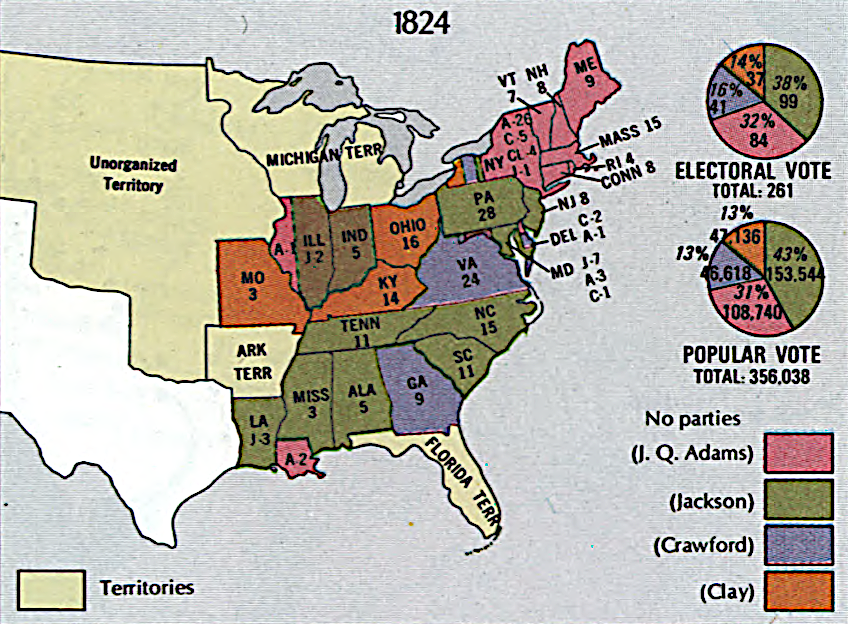
in 1824 Virginia voted for William H. Crawford, and the House of Representatives ultimately chose the winner of the presidential election
Source: Library of Congress, The national atlas of the United States of America
Virginia Government and Politics
Virginia Places




































